#more general meta about
Text
So I accidentally almost got into an argument on Twitter, and now I'm thinking about bad historical costuming tropes. Specifically, Action Hero Leather Pants.
See, I was light-heartedly pointing out the inaccuracies of the costumes in Black Sails, and someone came out of the woodwork to defend the show. The misunderstanding was that they thought I was dismissing the show just for its costumes, which I wasn't - I was simply pointing out that it can't entirely care about material history (meaning specifically physical objects/culture) if it treats its clothes like that.
But this person was slightly offended on behalf of their show - especially, quote, "And from a fan of OFMD, no less!" Which got me thinking - it's true! I can abide a lot more historical costuming inaccuracy from Our Flag than I can Black Sails or Vikings. And I don't think it's just because one has my blorbos in it. But really, when it comes down to it...
What is the difference between this and this?
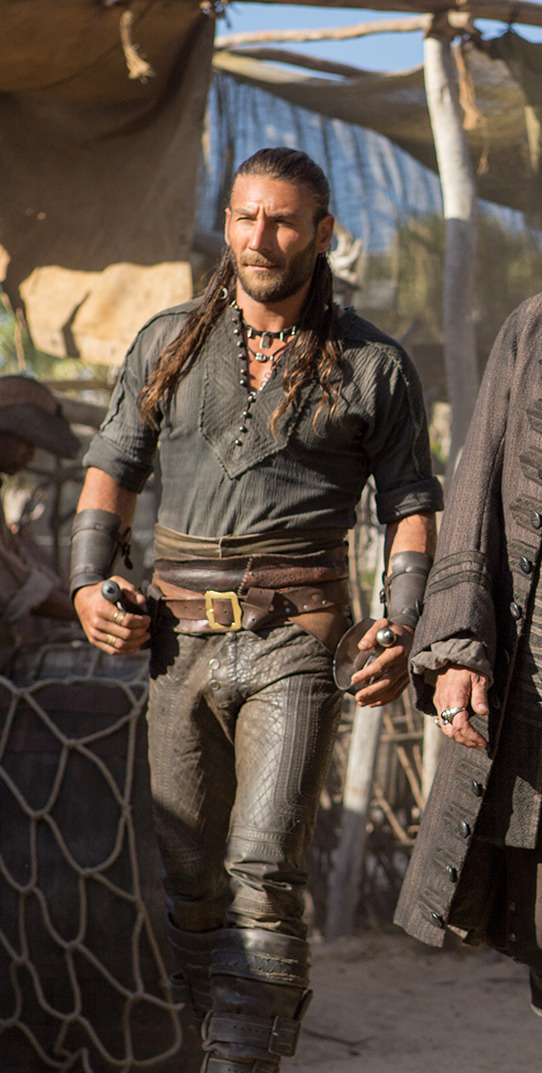
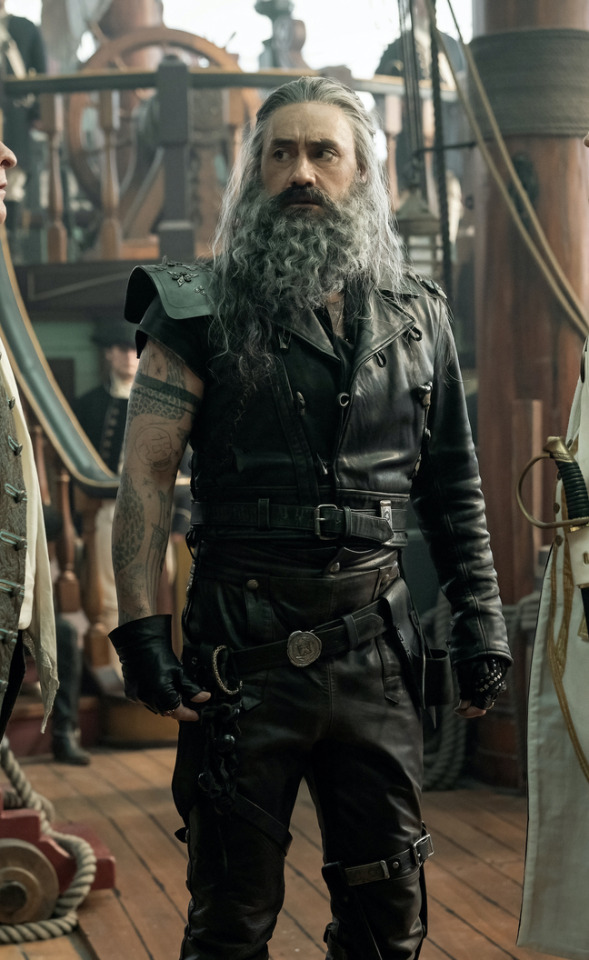
Here's the thing. Leather pants in period dramas isn't new. You've got your Vikings, Tudors, Outlander, Pirates of the Caribbean, Once Upon a Time, Will, The Musketeers, even Shakespeare in Love - they love to shove people in leather and call it a day. But where does this come from?
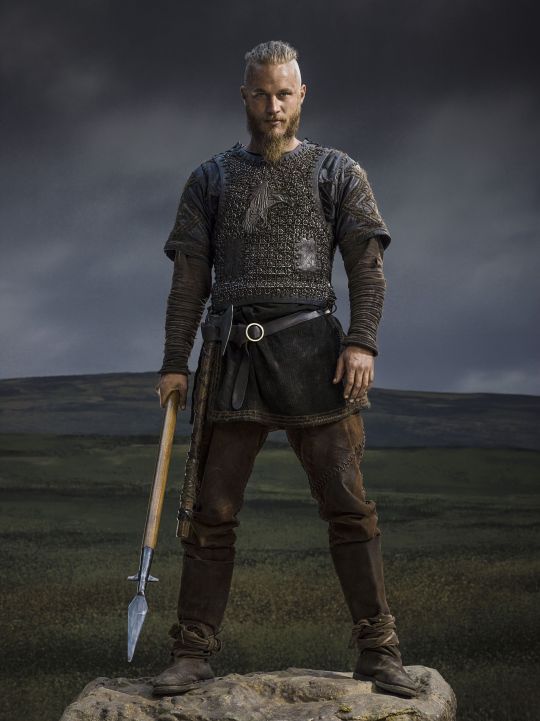
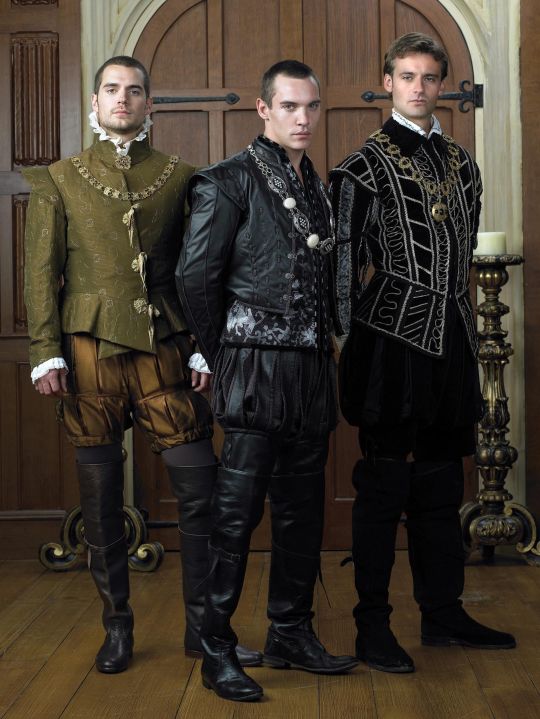
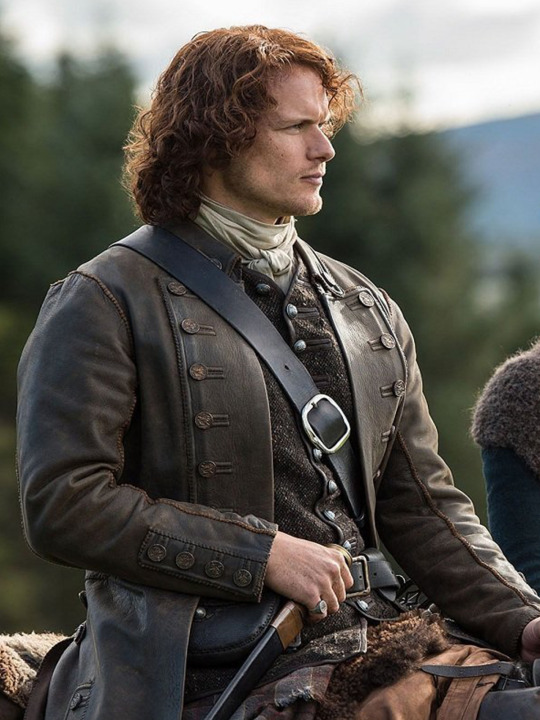

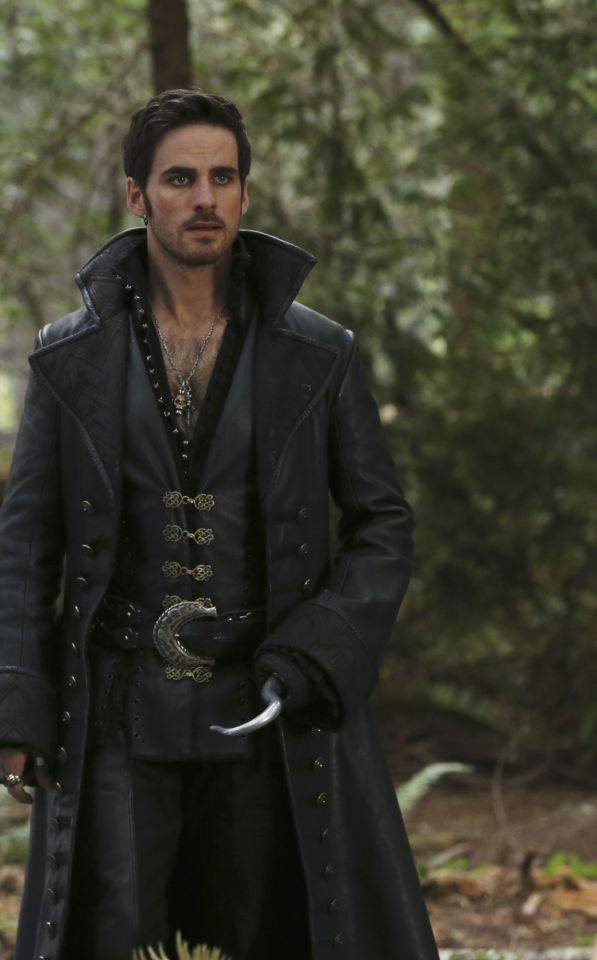
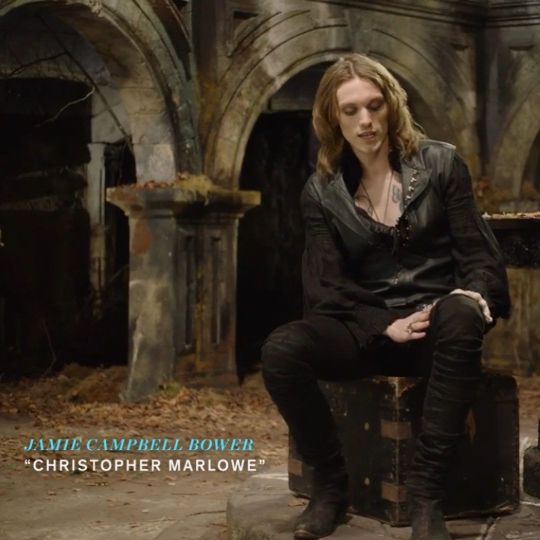
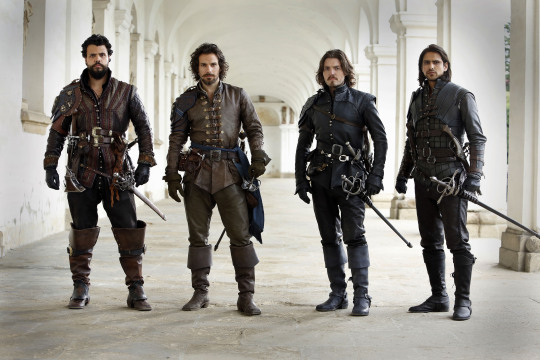
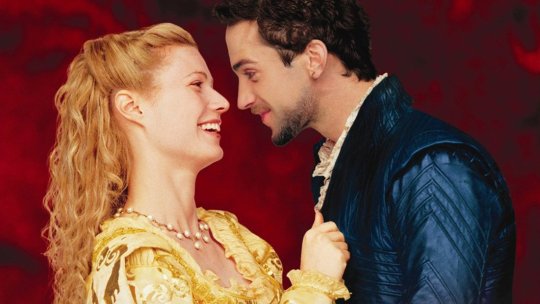
Obviously we have the modern connotations. Modern leather clothes developed in a few subcultures: cowboys drew on Native American clothing. (Allegedly. This is a little beyond my purview, I haven't seen any solid evidence, and it sounds like the kind of fact that people repeat a lot but is based on an assumption. I wouldn't know, though.) Leather was used in some WWI and II uniforms.
But the big boom came in the mid-C20th in motorcycle, punk/goth, and gay subcultures, all intertwined with each other and the above. Motorcyclists wear leather as practical protective gear, and it gets picked up by rock and punk artists as a symbol of counterculture, and transferred to movie designs. It gets wrapped up in gay and kink communities, with even more countercultural and taboo meanings. By the late C20th, leather has entered mainstream fashion, but it still carries those references to goths, punks, BDSM, and motorbike gangs, to James Dean, Marlon Brando, and Mick Jagger. This is whence we get our Spikes and Dave Listers in 1980s/90s media, bad boys and working-class punks.
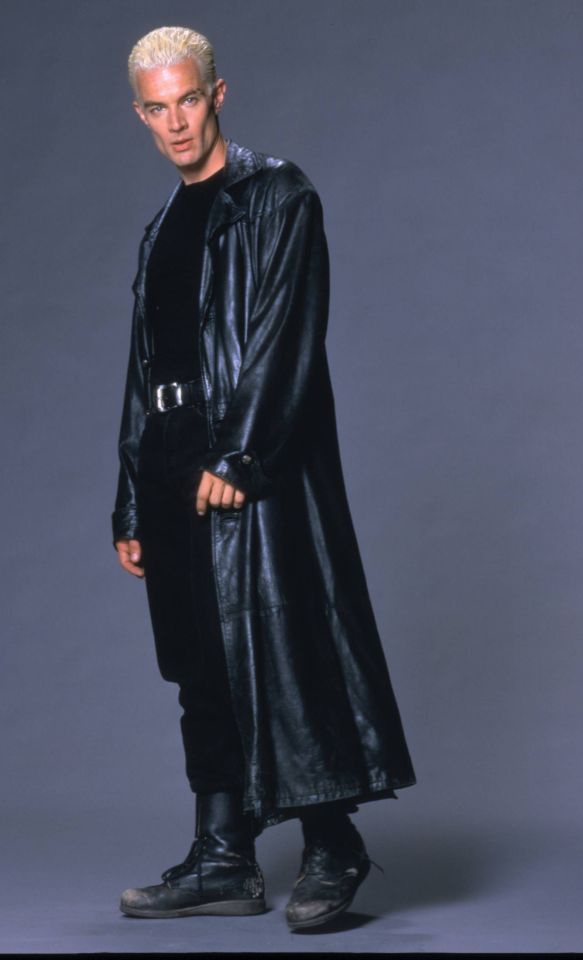
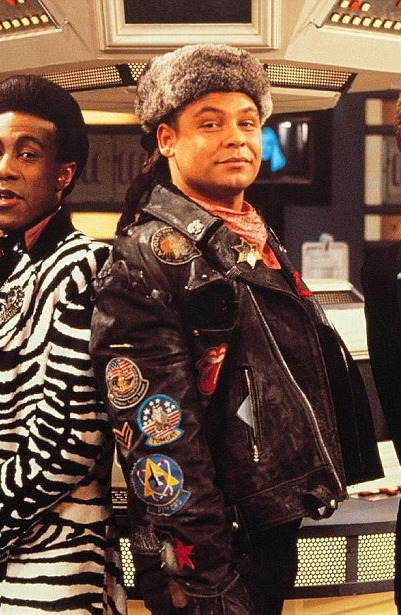
And some of the above "historical" design choices clearly build on these meanings. William Shakespeare is dressed in a black leather doublet to evoke the swaggering bad boy artist heartthrob, probably down on his luck. So is Kit Marlowe.
But the associations get a little fuzzier after that. Hook, with his eyeliner and jewellery, sure. King Henry, yeah, I see it. It's hideously ahistorical, but sure. But what about Jamie and Will and Ragnar, in their browns and shabby, battle-ready chic? Well, here we get the other strain of Bad Period Drama Leather.
See, designers like to point to history, but it's just not true. Leather armour, especially in the western/European world, is very, very rare, and not just because it decays faster than metal. (Yes, even in ancient Greece/Rome, despite many articles claiming that as the start of the leather armour trend!) It simply wasn't used a lot, because it's frankly useless at defending the body compared to metal. Leather was used as a backing for some splint armour pieces, and for belts, sheathes, and buckles, but it simply wasn't worn like the costumes above. It's heavy, uncomfortable, and hard to repair - it's simply not practical for a garment when you have perfectly comfortable, insulating, and widely available linen, wool, and cotton!
As far as I can see, the real influence on leather in period dramas is fantasy. Fantasy media has proliferated the idea of leather armour as the lightweight choice for rangers, elves, and rogues, a natural, quiet, flexible material, less flashy or restrictive than metal. And it is cheaper for a costume department to make, and easier for an actor to wear on set. It's in Dungeons and Dragons and Lord of the Rings, King Arthur, Runescape, and World of Warcraft.
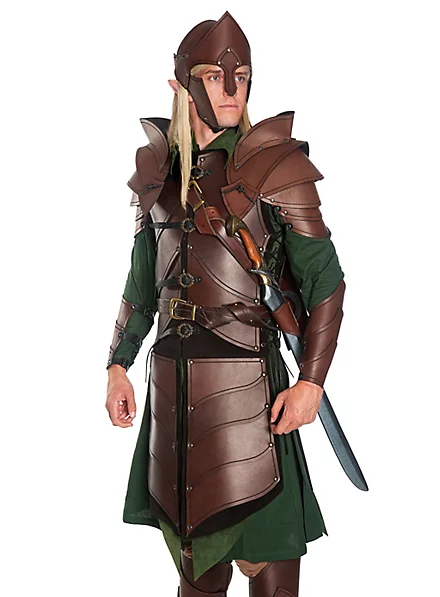
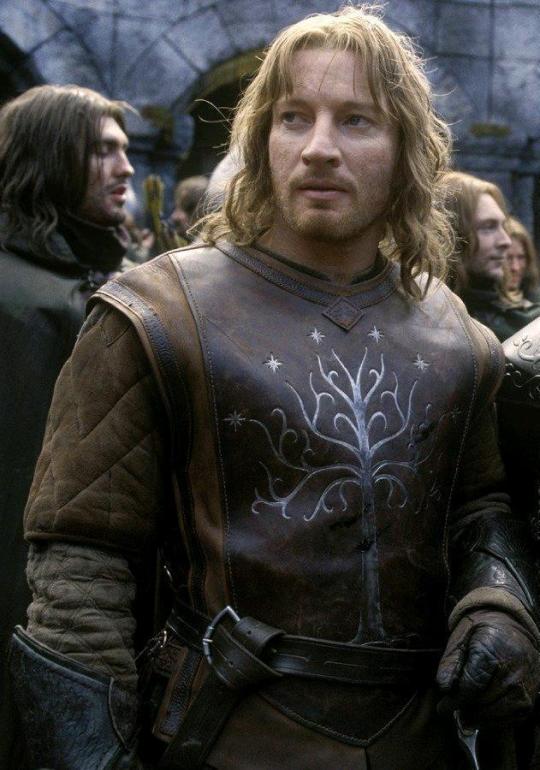
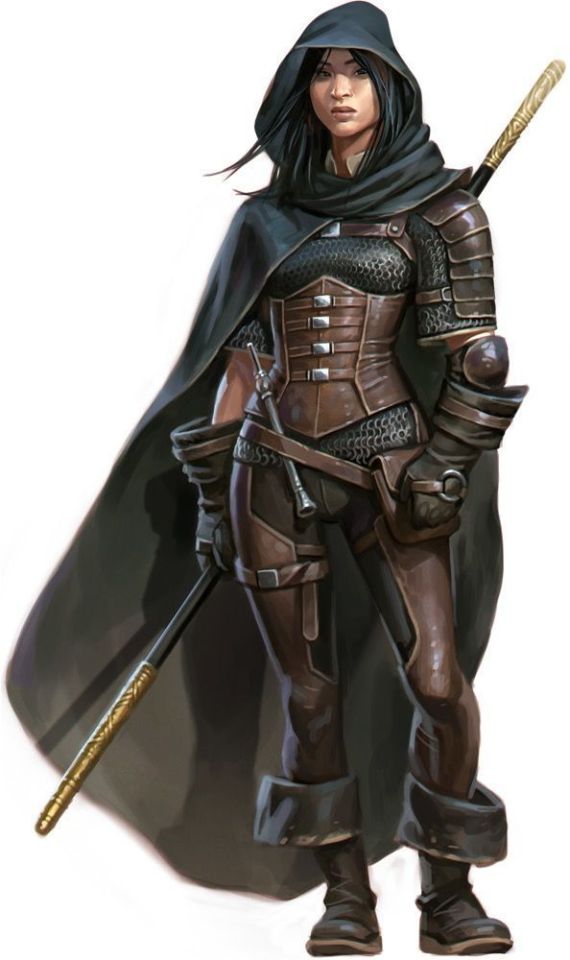
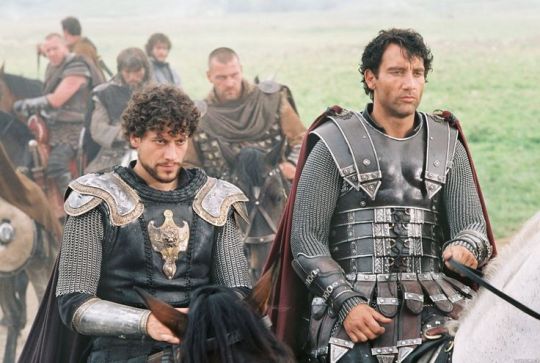

And I think this is how we get to characters like Ragnar and Vane. This idea of leather as practical gear and light armour, it's fantasy, but it has this lineage, behind which sits cowboy chaps and bomber/flight jackets. It's usually brown compared to the punk bad boy's black, less shiny, and more often piecemeal or decorated. In fact, there's a great distinction between the two Period Leather Modes within the same piece of media: Robin Hood (2006)! Compare the brooding, fascist-coded villain Guy of Gisborne with the shabby, bow-wielding, forest-dwelling Robin:
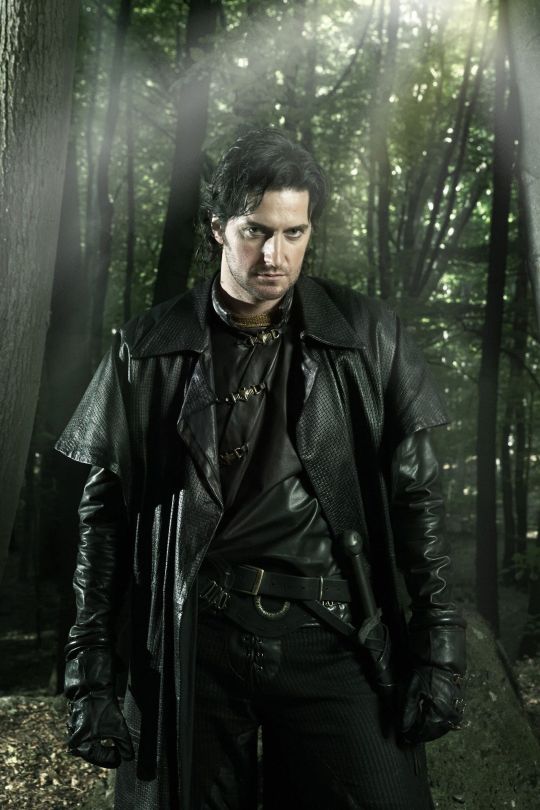
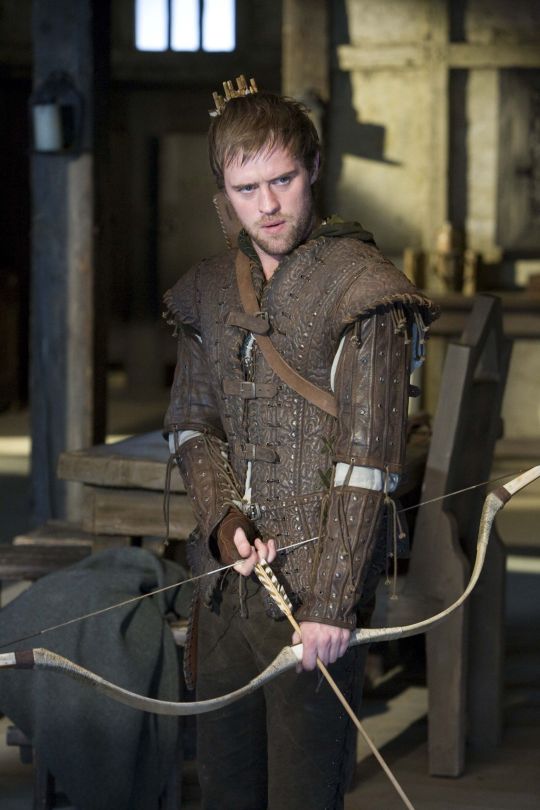
So, back to the original question: What's the difference between Charles Vane in Black Sails, and Edward Teach in Our Flag Means Death?
Simply put, it's intention. There is nothing intentional about Vane's leather in Black Sails. It's not the only leather in the show, and it only says what all shabby period leather says, relying on the same tropes as fantasy armour: he's a bad boy and a fighter in workaday leather, poor, flexible, and practical. None of these connotations are based in reality or history, and they've been done countless times before. It's boring design, neither historically accurate nor particularly creative, but much the same as all the other shabby chic fighters on our screens. He has a broad lineage in Lord of the Rings and Pirates of the Caribbean and such, but that's it.
In Our Flag, however, the lineage is much, much more intentional. Ed is a direct homage to Mad Max, the costuming in which is both practical (Max is an ex-cop and road warrior), and draws on punk and kink designs to evoke a counterculture gone mad to the point of social breakdown, exploiting the thrill of the taboo to frighten and titillate the audience.
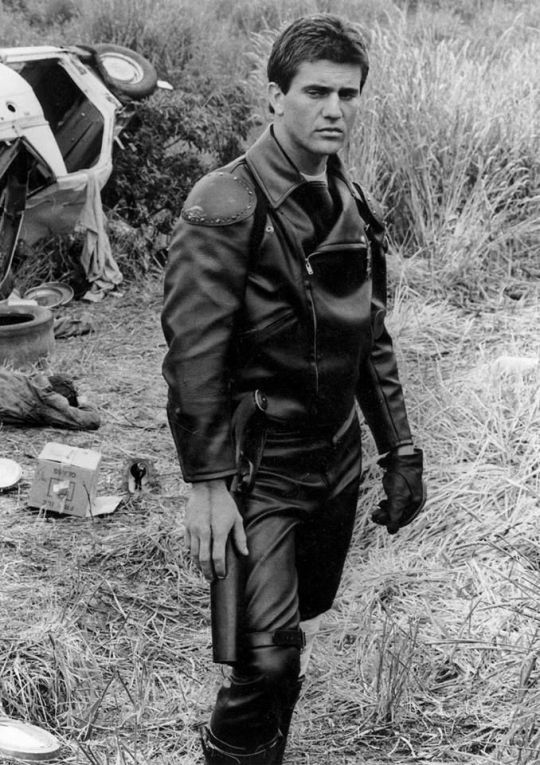
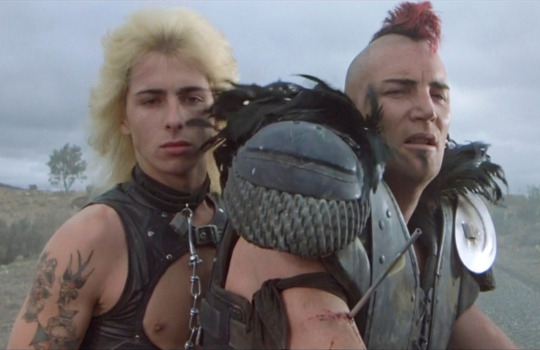
In particular, Ed is styled after Max in the second movie, having lost his family, been badly injured, and watched the world turn into an apocalypse. He's a broken man, withdrawn, violent, and deliberately cutting himself off from others to avoid getting hurt again. The plot of Mad Max 2 is him learning to open up and help others, making himself vulnerable to more loss, but more human in the process.
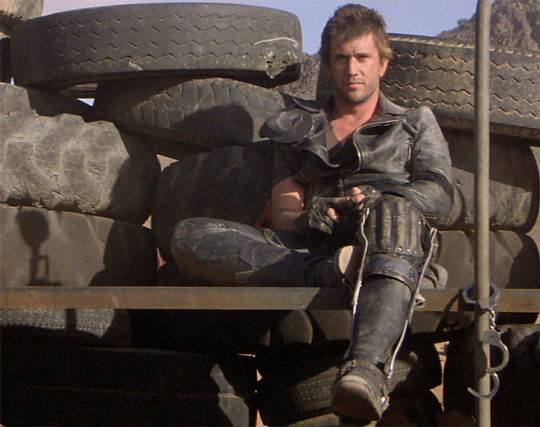
This ties directly into the themes of Our Flag - it's a deliberate intertext. Ed's emotional journey is also one from isolation and pain to vulnerability, community, and love. Mad Max (intentionally and unintentionally) explores themes of masculinity, violence, and power, while Max has become simplified in the popular imagination as a stoic, badass action hero rather than the more complex character he is, struggling with loss and humanity. Similarly, Our Flag explores masculinity, both textually (Stede is trying to build a less abusive pirate culture) and metatextually (the show champions complex, banal, and tender masculinities, especially when we're used to only seeing pirates in either gritty action movies or childish comedies).
Our Flag also draws on the specific countercultures of motorcycles, rockers, and gay/BDSM culture in its design and themes. Naturally, in such a queer show, one can't help but make the connection between leather pirates and leather daddies, and the design certainly nods at this, with its vests and studs. I always think about this guy, with his flat cap so reminiscient of gay leather fashions.
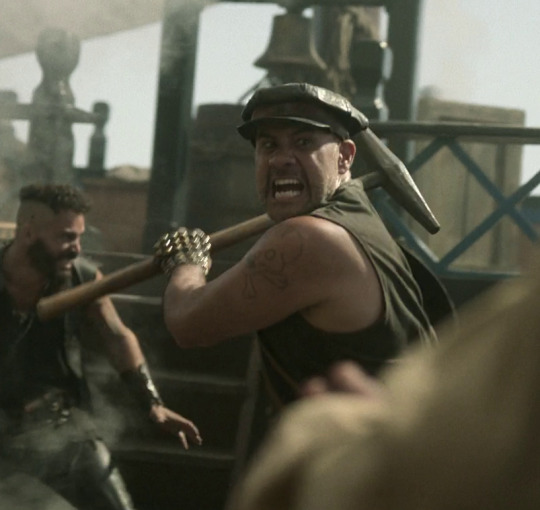
More overtly, though, Blackbeard and his crew are styled as both violent gangsters and countercultural rockstars. They rove the seas like a bikie gang, free and violent, and are seen as icons, bad boys and celebrities. Other pirates revere Blackbeard and wish they could be on his crew, while civilians are awed by his reputation, desperate for juicy, gory details.
This isn't all of why I like the costuming in Our Flag Means Death (especially season 1). Stede's outfits are by no means accurate, but they're a lot more accurate than most pirate media, and they're bright and colourful, with accurate and delightful silks, lace, velvets, and brocades, and lovely, puffy skirts on his jackets. Many of the Revenge crew wear recognisable sailor's trousers, and practical but bright, varied gear that easily conveys personality and flair. There is a surprising dedication to little details, like changing Ed's trousers to fall-fronts for a historical feel, Izzy's puffy sleeves, the handmade fringe on Lucius's red jacket, or the increasing absurdity of navy uniform cuffs between Nigel and Chauncey.
A really big one is the fact that they don't shy away from historical footwear! In almost every example above, we see the period drama's obsession with putting men in skinny jeans and bucket-top boots, but not only does Stede wear his little red-heeled shoes with stockings, but most of his crew, and the ordinary people of Barbados, wear low boots or pumps, and even rough, masculine characters like Pete wear knee breeches and bright colours. It's inaccurate, but at least it's a new kind of inaccuracy, that builds much more on actual historical fashions, and eschews the shortcuts of other, grittier period dramas in favour of colour and personality.
But also. At least it fucking says something with its leather.
#everyone say 'thank you togas' for not including a long tangent about evil rimmer in red dwarf 5x05#Our Flag Means Death#Togas does meta#and yes these principles DO fall apart slightly in s2 and i DON'T like those costumes as much#don't get me wrong they're fun and gorgeous - but generally a bit less deep and more inaccurate. so. :(#I'm not sure this really says anything new about Our Flag but I just needed to get my thoughts out#i hate hate hate Gritty Period Drama costumes they're so boring and so ugly and so wrong#god bless OFMD for using more than 3 muted colours and actually putting men in heels (and not as a shorthand for rich/foppish villainy) <3#looking at that Tudors still is insane like they really will go to any lengths to not make men feel like they've got bare legs XD#image descriptions in alt text#and yes i DID just sink about two hours into those so you'd better appreciate them
1K notes
·
View notes
Text
As much as I love AA4, the more I think about it the more I am just immensely bothered by the designs of Troupe Gramarye. Trucy having less melanin than either of her parents is something that’s brought up a lot, and yeah, fair, but what really irks me is that if you line up them up from good to evil (at least in terms of how they’re generally spoken about / viewed in game) it’s just light to dark:

#ace attorney#not tagging every character bc it’s more about the game in general#I have. a lot of opinions about Zak in particular bc the way they characterize him is. mega fucking yikes#but that’s for another post#meta#mod vex
436 notes
·
View notes
Text
i need to get this out of my head before i continue clone^2 but danny being the first batkid. Like, standard procedure stuff: his parents and sister die, danny ends up with Vlad Masters. He drags him along to stereotypical galas and stuff; Danny is not having a good time.
He ends up going to one of the Wayne Galas being hosted ever since elusive Bruce Wayne has returned to Gotham. Vlad is crowing about having this opportunity as he's been wanting to sink his claws into the company for a long while now. Danny is too busy grieving to care what he wants.
And like most Galas, once Vlad is done showing him off to the other socialites and the like, he disappears. Off to a dark corner, or to one of the many balconies; doesn't matter. There he runs into said star of the show, Bruce who is still young, has been Batman for at least a year at this point, but still getting used to all these damn people and socializing. He's stepped off to hide for a few minutes before stepping back into the shark tank.
And he runs into a kid with circles under his eyes and a dull gleam in them. Familiar, like looking into a mirror.
Danny tries to excuse himself, he hasn't stopped crying since his parents died and it's been months. He rubs his eyes and stands up, and stumbles over a half-hearted apology to Mister Wayne. Some of Vlad's etiquette lessons kicking in.
Bruce is awkward, but he softens. "That's alright, lad," he says, pulling up some of that Brucie Wayne confidence, "I was just coming out here to get some fresh air."
There's a little pressing; Bruce asks who he's here with, Danny says, voice quiet and grief-stricken, that he's with his godfather Vlad Masters. Bruce asks him if he knows where he is, and Danny tells him he does. Bruce offers to leave, Danny tells him to do whatever he wants.
It ends with Bruce staying, standing off to the side with Danny in silence. Neither of them say a word, and Danny eventually leaves first in that same silence.
Bruce looks into Vlad Masters after everything is over, his interest piqued. He finds news about him taking in Danny Fenton: he looks into Danny Fenton. He finds news articles about his parents' deaths, their occupations, everything he can get his hands on.
At the next gala, he sees Danny again. And he looks the same as ever: quiet like a ghost, just as pale, and full of grief. Bruce sits in silence with him again for nearly ten minutes before he strikes a conversation.
"Do you like to do anything?"
Nothing. Just silence.
Bruce isn't quite sure what to do: comfort is not his forte, and Danny doesn't know him. He's smart enough to know that. So he starts talking about other things; anything he can think of that Brucie Wayne might say, that also wasn't inappropriate for a kid to hear.
Danny says nothing the entire time, and is again the first to leave.
Bruce watches from a distance as he intercts with Vlad Masters; how Vlad Masters interacts with him. He doesn't like what he sees: Vlad Masters keeps a hand on Danny's shoulder like one would hold onto the collar of a dog. He parades him around like a trophy he won.
And there are moments, when someone gets too close or when someone tries to shake Danny's hand, of deep possessiveness that flints over Vlad Masters' eyes. Like a dragon guarding a horde.
He plays the act of doting godfather well: but Bruce knows a liar when he sees one. Like recognizes like.
Danny is dull-eyed and blank faced the entire time; he looks miserable.
So Bruce tries to host more parties; if only so that he can talk to Danny alone. Vlad seems all too happy to attend, toting Danny along like a ribbon, and on the dot every hour, Danny slips away to somewhere to hide. Bruce appears twenty minutes later.
"I was looking into your godfather's company," he says one night, trying to think of more things to say. Some nights all they do is sit in silence. "Some of my shareholders were thinking of partnering up--"
"Don't."
He stops. Danny hardly says a word to him, he doesn't even look at him -- he's sitting on the ground, his head in his knees. Like he's trying to hide from the world. But he's looking, blue eyes piercing up at Bruce.
Bruce tilts his head, practiced puppy-like. "Pardon?"
"Don't." Danny says, strongly. "Don't make any deals with Vlad."
It's the most words Danny's spoken to him, and there's a look in his eyes like a candle finding its spark. Something hard. Bruce presses further, "And why is that?"
The spark flutters, and flushes out. Danny blinks like he's coming out of a trance, and slumps back into himself. "Just don't."
Bruce stares at him, thoughtful, before looking away. "Alright. I won't."
And they fall back into silence.
Danny, when he leaves, turns to look at Bruce, "I mean it." He says; soft like he's telling a secret, "Don't make any deals with him. Don't be alone with him. Don't work with him."
He's scampered away before Bruce can question him further.
(He never planned on working with Vlad Masters and his company; he's done his research. He's seen the misfortune. But nothing ever leads back to him. There's no evidence of anything. But Danny knows something.)
At their next meeting, Danny starts the conversation. It's new, and it's welcomed. He says, cutting through their five minute quiet, that he likes stars. And he doesn't like that he can't see them in Gotham.
Bruce hums in interest, and Danny continues talking. It's as if floodgates had been opened, and as Bruce takes a sip of his wine, it tastes like victory.
("Tucker told me once--")
("Tucker?")
("Oh-- uh, one of my best friends. He's a tech geek. We haven't talked in a while.")
(Danny shut down in his grief -- his friends are worried, but can't reach him. When he goes back to the manor with Vlad, he fishes out his phone and sends them a message.)
(They are ecstatic to hear from him.)
It all culminates until one day, when Danny is leaving to go back inside, that Bruce speaks up. "You know," He says, leaning against the railing. "The manor has many rooms; plenty of space for a guest."
The implication there, hidden between the lines. And Danny is smart, he looks at Bruce with a sharp glean in his eyes, and he nods. "Good to know."
The next time they see each other, Danny has something in his hands. "Can you hold onto something for me?" He asks.
When Bruce agrees, Danny places a pearl into his palm. or, at least, it's something that looks like a pearl. Because it's cold to the touch; sinking into Bruce's white silk gloves with ease and shimmering like an opal. It moves a little as it settles into his hand, and the moves like its full of liquid.
Bruce has never seen anything like it before, but he does know this; it's not human. "What is it?" He asks, and Danny looks uncomfortable.
"I can't tell you that." He says, shifting on his foot like he's scared of someone seeing it. "But please be careful with it. Treat it like it's extremely fragile."
When Bruce gets home, he puts it in an empty ring box and hides the box in the cave. He tries researching into what it is. he can't find anything concrete.
Everything comes to a head one day when Danny appears at the manor's doorstep one evening, soaking wet in the rain, and bleeding from the side.
#dpxdc#dp x dc#danny fenton is not the ghost king#dpxdc crossover#dpdc#dp x dc crossover#dpxdc prompt#man i just really need more dpdc stuff where danny and bruce have a good relationship. like man i NEED it. like i need to see these two#bonding together. and not in a cracky 'oh danny is a distant friend/cousin/etc' stuff but like. active participants in each other's lives#or as active as can be in this case. i neeeeed these two getting along and caring about one another#this idea came to me like last night and hasn't left since nd it was driving me up the wall to think about both positively and negatively b#i neeeded someone to hear about this or i was gonna implode#danny is the first son#tried to just get the general gist of the idea down but i definitely thought of the idea that bruce lowkey suspects vlad for having a hand#Vlad allows Danny to sneak off because he thinks Danny is alone. if he knew Bruce was there he'd be piiisssed and would put a stop to it#Sam and Tucker are alive they just got ghosted for a bit by danny bc he was in Major Grief and didn't wanna socialize. He couldn't go to#them because he didn't wanna put them in danger via Vlad.#oh that thing he handed Bruce? Yeah that's his ghost core. I have a headcanon (that isnt always applied) that ghosts can take their cores#out of their bodies at will and painlessly and without issue. and its common practice actually to do so bc they can be a not insignificant#distance away from said core before problems start to act up. and its common for ghosts to leave their physical cores at their lairs for#safekeeping because as long as the physical core is fine: so is the ghost. they can reform if their body gets destroyed. it also acts as a#fast travel sometimes. where they can reform at their core in an instant. its not inspired in the slightest by SU but i do see the overlap#most cores are pretty small for safety sake: its harder to hit if its small. and they're pr resilient too but its better to be safe than#sorry. so yeah. danny essentially gave bruce the physical embodiment of his soul and indirectly said#'if anything happens to me at least i'll be safe with you'#danny doesn't know he's batman btw#starry rambles.#was gonna go into danny becoming a vigilante beside bruce but im sleeeepy so i'll do that in a reblog. he's gonna go by nightingale if#anyone is interested. stereotypical but to be frank it is a *good* name imo. has a good amount of syllables and consonants to it#and the bird theme. and since its part of an ancestral name it has even more backing for it being bird-y without being meta
303 notes
·
View notes
Text
Izzy Discourse Masterpost
Hey all, given the amount of awful splintering and wank happening in ofmd fandom rn regarding Izzy's death, including the flat-out immature and unacceptable harassment of David Jenkins and Co, I wanted to just make this one all-encompassing post to address the various grievances and complaints I've seen (almost entirely on Twitter). If I've missed anything, please feel free to add on. I'm putting most of this under a read-more for length.
Please be aware, I say all of this as an Izzy fan. I've loved his character since season 1, and while I was sad to see him go, I completely understand and support David & Co's reasons for concluding his arc, and I think it was done respectfully in a way fitting to his character. So let's break down some of the takes I've seen. I am not referencing specific posts or people here, I just want to address the general themes that I keep seeing about why some people are upset.
Izzy's death served no narrative purpose.
Look, this is one that I'm sure fans will debate for the rest of the hiatus. It's completely within your right to disagree with this writing choice, but Izzy's death did serve a narrative purpose in the story that David Jenkins is telling - and he has spoken to this end in several interviews already. I can only summarize here, and fans may find other perspectives in time as well. What we need to remember is that Our Flag Means Death is, at the end of the day, Ed and Stede's love story. That has been made abundantly, explicitly clear. The show has been fantastic at fleshing out the other supporting characters, but that's what they are - supporting characters. They often have their own subplots but ultimately the narrative seeks to move Ed and Stede's story forward and they are tools to spur Ed and Stede's growth or mirror their struggles. Izzy has been a wonderfully complex, multifaceted character but we must remember that all characters are vessels through which stories are told, lessons are imparted, and metaphors are established. He's not a real person who 'deserves' any particular fate. David said he's always intended for Izzy to die at the end of his arc.
Firstly, Izzy (now canonically, through his own dying words) represents part of Blackbeard. He enabled and encouraged Ed's darker side, they were mutually toxic forces to each other. Ed is attempting to cope with and move on from this phase of his life, and like Stede in season 1, set out a free man, unshackled by expectations and loose ends of those he's hurt and been hurt by (though we realize this is an ongoing process that takes time). This lovely gifset sums it up nicely, with Izzy being the Mary parallel, and making s2 mirror s1. Blackbeard is both Ed and Izzy; Ed cannot be free of Blackbeard while Izzy is in his life, and when Izzy is gone he will never truly be Blackbeard again. They are each other's rotting leg!! Yet, they love each other - and David has said that for Ed, this has developed into a mentor and father relationship, and where Ed has previously despised his father figures (his actual father, Hornigold) he does not want to lose Izzy. This time, Izzy brings out Ed, not Blackbeard - and that's where we get the callback to 'there he is', bringing their impact on each other full circle, freeing Ed, getting approval of sorts that he never had, to be soft, to be loved (and there are parallels to Zheng and Auntie here as well that others have made) from that force that drove him to stay in line all this time. David has said in multiple interviews now that he was going for the idea of the mentor/father figure dying and the hero living on and trying to do justice to them.
From Izzy's side, Izzy cannot be free while Edward remains either (Mary cannot find peace while Stede remains). The scar never truly healed, the leg will always be a reminder. At this point the argument becomes 'yes, but why did he have to die? Why not just sail off with the crew of the Revenge?' David has stated that he feels they've done everything they can with, and for, Izzy; he's come leagues from season 1, he's found community, he's found hope, he's found new parts of himself, and he's made good memories. He's found worth outside of what he can be to others. That's more than most pirates could hope for. Where would his character go from there, when the Golden Age of Piracy he belongs to has burned to the ground? Would he stay around and whittle on the Revenge? If he were a real person, yes, that would be lovely, and he'd deserve all the quiet peaceful happiness in the world. But as I explain several points below, he's not interested in being a captain. He's not up for the hard physical labor of regular crew, and he's extremely overqualified for that besides. He has served his narrative purpose, and symbolically, to enter a new age, everything must go. He's connected to the old age of piracy, to the Republic of Pirates, that is now demolished. To him, fighting for what he believes in, for the family he's found, bringing down an army of British twats in the process, is how he should go. It's a pirate's death, and as Izzy's said, he's a pirate - unlike Blackbeard who's succeeding in breaking away from piracy, Izzy never wanted to stop being a pirate, throughout his arc. To me, that's why Izzy remains trapped in the narrative, trapped in history, whereas Ed and Stede will escape history. They leave piracy, and canon, behind, while Izzy was content to remain a pirate and face a pirate's fate.
Burying him on land, right next to Ed and Stede's beach house, shows that his sacrifice was not in vain - they start this new life together, thanks to Izzy's mentorship, his role in their lives that sometimes for worse, sometimes for better, made their love what it was and made their breakaway possible. The new age is built on the foundations of the old age, and is stronger for it.
As we're well aware by now, David tweeted that there's no version of ofmd without Izzy. Whether that's literal or not, symbolically it's true. Izzy's arc of growth affected everyone on the Revenge. Jim fondly remembered fighting for a time when life meant something on that ship; the crew helped give Izzy new meaning in life, and he helped them in return. When he dies, they mourn and have a funeral; that wouldn't have happened under Blackbeard's watch in episode 2. His life meant something to them. He influenced Ed and Stede immensely, and they will take that with them. As David's said, they're all a family, and Izzy was a part of that family, and his loss unites them and brings them closer to continue to fight for that family they've built. It's a tragic, sudden death of someone they've all grown to care for, and that steels their reserve to keep the torch lit. They literally sail off into the sunset to hunt down Ricky to avenge Izzy; he will always be a part of this show. And, of course, with the brief appearance of seagull Buttons, the door is left open for anything.
If this was The Izzy Show, then sure, we'd be content to see him simply engaged in shenanigans every episode. But the plot, and therefore the characters, need to keep moving forward, and Izzy got his growth and development. He got what he needed for his character to have closure, and he served his symbolic narrative purpose in Ed's (and Stede's) story. You may have your own ideas and perspectives, and that's great - that's what fandom is for. But we cannot say his death was pointless when David Jenkins and the writers clearly had a well-defined motive for pushing the narrative in this direction. I actually think the narrative around Ed and Izzy is the most well-developed in the entire show. I for one am so happy we got such an interesting and complex character, and had the brilliant Con O'Neill to portray him.
Izzy's growth & healing arc was rendered pointless by his death.
As this post so eloquently puts it, it's pretty bleak to have the outlook that taking steps to heal and find meaning in life is worthless if it's later lost. Seeking happiness and self-actualization is worthwhile for its own sake; no one knows what's down the road, and we all die eventually. Find meaning in life now. Would you rather have had Izzy not miss with his bullet in ep2? He was given the chance to experience joy, freedom, and hope for the first time in potentially a long time, and when he died he did so with those happy memories. As mentioned, Izzy's death was decided long beforehand given the narrative, and the point of storytelling is to make you feel emotions. We were given impetus to connect and relate to Izzy's character through his process of healing, so when he did die, we felt it keenly. That's how stories work actually! We felt what Ed felt. It moved us. It's not a bad thing that Izzy's arc made him more likeable to fans before his death. It's not a bad thing to lose a beloved character - guess what, it happens constantly in stories - and it's not bad to grieve over it either, but to say that it made his journey pointless is just not true. People saying that Con must be upset that they snatched his character away from him after getting to develop him so much - again I say, would you rather him have died in ep 2 before he had the chance to grow? Or how about in s1, when the crew tried to mutiny? How'd you feel when Stede killed him in his dream, in the very first scene of the season? I think Con's probably glad for the opportunity to have explored this character so much in season 2. Ask him if he thinks it was pointless.
Killing off Izzy was bad for queer rep/burying your gays/"Izzy was the queer heart of the show"
I'm putting 'bury your gays' on the top shelf so people can't use it when it doesn't actually apply. Most of the main cast of characters in this show are queer, and it's a show about pirates with a good amount of violence. Ergo, chances are a queer character will die in the course of Things Happening In Stories. Izzy didn't die because he was queer, and he wasn't the token queer rep. Please turn your attention to the boatloads (literally) of queer characters that are happy and thriving (how about the LuPete wedding immediately afterwards??). As for Izzy being the "queer heart of the show," this is literally the Ed and Stede show. You know, the two queer leads whose queer love the show revolves around, per David Jenkins himself. I'm glad folks connected with and derived joy from Izzy's growth and especially his performance in Calypso's birthday, but he is not the main character of the show. The queer heart of the show is in fact, the entire show, all of their characters and the community & found family they create aboard the Revenge. Not to mention the fan community as well. Izzy was never carrying the show's representation on his back, and frankly that's an absurdly wild take to have (esp when he spent most of s1 actively working against the main queer relationships in the show, attempting to maintain the oppressive status quo of pirate society).
It was bad and irresponsible to have a suicidal character die
Are we forgetting the entire first half of the season where Ed, who was suicidal, kept trying to passively kill himself because he felt he was an unlovable monster, only to be shown that he is in fact loved unconditionally and it gives him the strength to fight for life and triumph against his own self-doubt? The show has spent quite a lot of effort telling viewers that despite feeling damaged or broken you are worthy of love and that you are loved even if it may be hard to see it when you're in a bad place. That you don't need to be fully healed to deserve love and care, and that love and support will help you along your journey. It's incredibly wild to disregard this major plot point and fundamental message of s2 to try and spin this the opposite way for Izzy's character.
Secondly, where are people getting 'Izzy is suicidal' from? Are we going back all the way to episode 2, when he's at his lowest point and fails at his suicide attempt, only to be figuratively reborn after removing the metaphorical rotten leg? By the time of the finale he's shown to be in a good place, thanks to the arc of healing and growth he's gotten, through the support of the Revenge crew and his 'breakup' with Blackbeard allowing him to find his own way in life, realizing he doesn't need a purpose to have value and enjoying his time on the Revenge and the bonds he's made with Stede and the crew. He is, in the words of Ivan, "the most open and available I've ever seen him" by the finale. To take episode 2 as evidence he's suicidal is to erase his whole season of growth, which is an ironic thing to do in the context of these arguments. There's no canon evidence Izzy Hands was suicidal post-'Fun and Games'.
As for 'irresponsible,' once again I say, David Jenkins is not your therapist, he's not 'Dad,' and has no responsibility to tell his story any other way than he intended to tell it. Please find media that gives you what you want or need, and if the death of a fictional character causes you this much distress please seek help. I mean this kindly but seriously.
Killing off Izzy was ableist/bad for disability rep.
I point once again to the rest of the characters, several of which are disabled in varied ways. There are literally multiple other amputee characters specifically. It's not good storytelling to wholly avoid killing off any character that is disabled/queer/poc/female or [insert marginalized group here], especially when a) it makes sense narratively, and b) there's plenty of representation of these groups in the media in question. The answer isn't making such characters invincible and immortal, it's increasing the number of these characters in shows so it's not devastating when some do die in the course of natural storytelling.
OFMD was my comfort show/safe space show, now it's ruined for me
I am not trying to be insensitive here when I say that's a problem that is yours and nobody else's. David Jenkins created this show with a three-season vision and a story in mind, and he is telling that story to the best of his ability the way he wants to. It's already been said that he and the crew did not anticipate the fandom becoming as large and passionate as it has. The plot of the show was never intended to be 'fan service,' and it's ironic that there were people complaining this season that there's been too many fanservice tropes, up until David and the rest of the writers room made a narrative decision they did not like, then the complaints changed to not coddling the fans enough.
We as viewers can derive joy from this show, it can be a comfort to us, it can be important to us. But it was not designed specifically for that purpose, therefore it cannot fail in that respect. We do not have the right to harass writers for not steering the ship in the direction we want - it's their work of art, and we can choose to either come along for the ride or not. It's rare to see creators actually given the chance to tell their story the way they intend (budget cuts aside), so let him do that. He should not cater to fans, or cave and change the story to appease us. Respect his right to create his art, and remember you have the right to create your own. That's what fanfiction is for - write fix-its to your heart's content, but keep these realms separate. David Jenkins and Co hold zero, and I mean zero, responsibility to you. He could not please everyone no matter what he did, it would be fruitless to try, and it would certainly compromise the quality of the story he set out to tell.
You are absolutely allowed to dislike choices made in any show. Curate your media experience. If this show no longer brings you joy, stop watching. But it was never David's purpose nor responsibility to juggle the mental health of millions of fans. Trying to put that on him will only make him less enthusiastic about interacting with fans or continuing to make this show. This isn't rocket science. You're responsible for yourself, not this guy you call 'Dad' that you've developed a parasocial-therapist relationship with.
Izzy should have become captain of the Revenge.
Really?? Firstly, we did actually get that already in s1. He was tyrannical and the crew mutinied. But even if you think 'well after his character arc he'd be better suited to it,' it goes against the point of this arc. He's found value in not having a distinct role or purpose on the ship, decoupling his worth from the job he's expected to perform. He's found his place amongst the crew, not commanding it. There's no narrative reason to put him in charge when he's expressed no further interest in slotting himself back into a role full of pressure and expectations.
Con O'Neill was only told halfway through filming, it's cruel to just kill off the character he loves so much.
Guys, he's an actor. More than that, an actor with a theater background. I think he's used to characters dying. You don't need to look out for him. Con and David spoke one on one about it at length so they were on the same page, and David even said that Con took it well. I'm sure Con had input, just as other members of the cast have influenced their characters' stories, costumes, backstories, etc. Do you really think David Jenkins hurt Con's feelings or something? The writers (remember, it's not just David, it's a whole team of hard-working people coming up with these ideas) gave Con such a chance to shine this season, really developing Izzy beyond what he was given in s1 and letting Con show off his full acting range. Why are you only focusing on the destination rather than the journey? Sure, Con's probably sad to see Izzy go, but please do not project your distress onto him or try and accuse David & Co of being 'cruel' to their cast. That's really ridiculous. It's constantly evident how close they all are.
More importantly, do you actually, seriously think that Con O'Neill would want fans to harass each other or the writers over his character? The man who preaches being kind above all? There is no better way to make an actor uncomfortable about a show and its fanbase than to start treating fictional characters like they're more important than real people. He would not want you to bully people over Izzy Hands, and it's mind-boggling that some of you have convinced yourself otherwise.
Lastly, I just want to talk about the fact that some people are holding OFMD to absurdly high expectations.
Our Flag Means Death has been a pioneer series for its diverse representation, earnest storytelling, and themes of hope, community, and love. It's fine to discuss aspects of the show with a critical eye, but so much of the discourse has truly felt like folks are trying to find fault in a show that is leagues ahead of the average tv series that we still enjoy. How many fan favorites are killed off all the time? How many plotlines are scrapped, or drawn out without closure, or contradicted the very next season? How many shows are indifferent or actively hostile towards their fanbase? How many have any queer characters, or actually do bury them? The bar's so low, and OFMD has risen above to give us so much. Some are holding the show to astronomical expectations, waiting for it to fall from the pedestal it's been placed on. If something you don't like happens in the show, it's not suddenly ruined or demoted to being ~just as bad as those other shows~. Give them some breathing room, have some perspective on how progressive the show is, and that perfection is impossible, especially meeting every single viewer's idea of it. This is basically a repeat of the recent Good Omens drama, with an absurd number of people harassing Neil Gaiman for breaking up Aziraphale and Crowley and leaving the second of three acts on a very predictable cliffhanger. Let stories be told, let them unfold as they may, and you are free to leave anytime. It's so wonderful that more queer love stories are becoming popular and even mainstream, but let's not shoot ourselves in the foot by tearing them down when they don't go exactly the way you want it, which often seems to mean no drama, no character deaths, and therefore no conflict or even plot!
Just, please be civil human beings, and while this seems to be a difficult thing for so many fandoms to do, just keep your fan opinions in the fan space. Never bring your grievances to the writers, never bully them and persecute them for telling a story that you opted into viewing. That's something that goes entirely against everything this show, and this cast and crew, have imparted onto us - the importance of kindness, support, community, and love. I'll say it again because it bears repeating: the fate of a fictional character is never more important than how you treat real people. Just be kind in real life, which includes the internet. Thanks.
Now please, let's work together to ensure we get a season 3. There's so much more story to be told, and if you want to see Izzy back, whether that's as flashbacks, as a ghost haunting the inn, or in the gravy basket, we'll need more episodes! #RenewAsACrew
#our flag means death#ofmd#ofmd s2#ofmd s2 spoilers#and after this i will speak of it no more ok#now once we're all calmed down i am really looking forward to meta about izzy's role in the narrative#i truly think izzy's one of the most well written characters on not just this show but on tv lately in general#suicide mention tw#I tried to put a read more under the first bullet point but tumblr's formatting basically deleted it#by automatically overriding it with an Expand#so sorry about the length and such
565 notes
·
View notes
Text
Zephrah actively postpones ruidusborn births. It is believed that the actual number of ruidusborn in exandrian history is much larger than has been officially recorded because the stigma of it was so intense that people lied about it. Alyxian, one of the few recorded ruidusborn heroes of the calamity who received direct blessings from three different prime deities (our very own Changebringer, the Archheart, and the Moonweaver) , has been all but forgotten (read: likely erased) by history.
The Archive of knowledge that revealed the truth of Predathos and Ruidus was never some forgotten thing—it was intentionally hidden by the elites in Vasselheim. And we have no idea how long they have been operating with that knowledge. We have no idea what they have been doing with that knowledge, what silent wars have been waging for years or decades or centuries. But we saw what they were willing to do, in Hearthdell. We saw the violence and suppression they were willing to commit. We saw the pettiness of the exandrian pantheon in the Dawnfather’s response to Deanna’s: “Are you worth saving?”. In the Changebringer’s manipulative change of course in her pleas to FCG. In the Wildmother’s rejection of Opal. In the knowledge we have that Imogen spent so much of her miserable time in Gelvaan begging the gods to aid her to no avail—just for Kord to reach out only to demand that she not let them down.
Liliana’s point that Vasselheim and the other faithful elite of the world will hunt ruidusborn down to negate even the potential of this happening again isn’t new, it isn’t something this solstice and the machinations surrounding it caused, and it isn’t some unsubstantiated, fearful claim—it has been happening.
The vanguard—and Liliana—are unequivocally wrong in their means. But can you really fault them in their desire? Can you really fault the conclusions they have drawn from the experiences they have lived? If you spend your entire life being rejected by the people and the pantheon of your world for means you could not possibly control, would you not seek out someone and somewhere that would accept you? And if you found it, if some being that has been connected with you your whole life welcomed you home and wrapped you in an embrace that felt like your mother’s and says that it is starving; well, aren’t you, too?
There is likely a holy war brewing. At the end of it all, is it truly the sole fault of the people and not the organizations and society that expelled them?
#critical role#liliana temult#cr spoilers#bells hells#critical role meta#i understand that tumblr isn’t the place for god or vanguard nuance but I wanted to extend my thoughts here For Posterity#it just baffles me that some people still think Ludinus doesn’t very clearly have motivations of his own#and that the vanguard and liliana and very likely even the weave mind are all pawns in a greater scheme#which just kind of renders all the attempts to claim that empathizing with the vanguard means agreeing with Ludinus completely moot#and also just. doesn’t allow room for far more interesting questions about exandrian society and faith#and to be more clear. CLEARLY there are bad people in the vangaurd i am not saying they are good please be normal#in general i think people get really caught up in certain characters’ perspectives and not the wider ones we as the audience have#which. to me. is a loss. these are interesting and extremely relevant and poignant questions to ask
89 notes
·
View notes
Text
someone might have already said this, I’ve been a little mia, buuut now that I have thought about it more, the couch scene actually makes so much sense?
the thing is, we’ve only been considering the couch metaphor from a meta standpoint - and don’t get me wrong, that is def an important aspect and they have been using it as such, for examply by showing us that the answer to the couch question is eddie’s couch (thank you 6x12 couch scene my most beloved <3) - but in that we are kinda forgetting that in contrast to the other metaphors (most notably heart and water metaphors <3) the couch metaphor first and foremost isn’t a meta metaphor, it is buck’s metaphor and thereby the only metaphor that the characters are actively aware of and so while the meta aspects of it definitely are at play (and in my opinion do hold up, because of course he has grown, but not yet enough and so this time the couch choice is half his own, while half still put on someone else again, and he still doesn’t see the one right in front of him) more importantly buck is actively trying to use the couch metaphor and is actively trying to put it into play by being proactive, but it also means that the couch metaphor is not infallible, because buck is not infallible
from buck’s perspective, natalia is a good candidate and he didn’t compromise on his own boundaries for her and she still came back and stood beside him through the emotional mess that was kameron having the baby even tho that was what originally made her run - of course he would want the couch metaphor to work for the two of them (people have said it before, but it bears repeating: buck is not omniscient, he does not see the narrative signs for why he and natalia are doomed!) and of course that would make him actively put the couch metaphor into play, it’s almost like a test, like him asking can we actually ‘pick a couch’ together that works for both of us synonymous with him asking if they actually fit (which is a big step up, because it IS him making that choice and him recognizing that ‘picking a couch’ kinda needs to be a both partners kinda thing and a compromise, not him accepting couches that are hoisted on him) - and only s7 will tell us and more importantly buck the answer to that, even tho we as the audience know that the couch buck is at ease on is already out there and waiting for him to see it <3
#9-1-1#911 spoilers#evan buckley#couch beloved#911 meta#buddie#kinda#couch is always buddie xD#anyways#I don't know if this makes sense to anyone#and whether or not the general idea has already been pointed out by someone else#because I have spent most of the last two days hacking up my lungs akldakjahskj#BUT#I had this realization today while thinking about the balcony couch question scene and buck's demeanor during it#he is actively trying to make the couch metaphor work for him#and that is not a bad thing#because it is him actively going into a relationship inquisitive and wondering whether it might work and NOT just letting a relationship#happen to him and expecting it to be the end-all perfect fairytale#so yeaaah growth <3 but not quite there yet#I will probs come back to this and have more thoguhts#but yeah#taht is where I am at <3
341 notes
·
View notes
Text
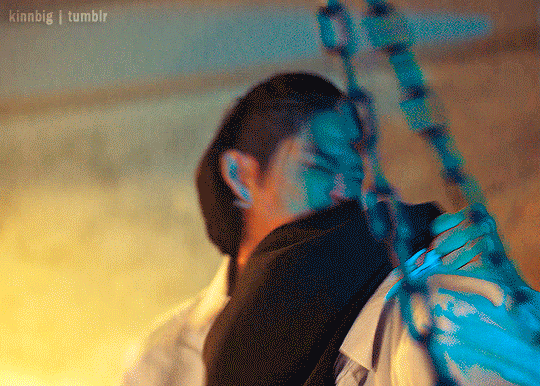
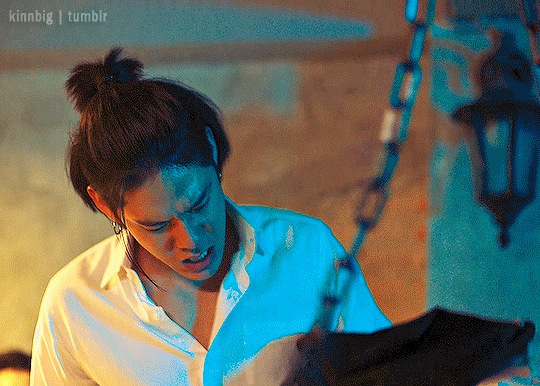
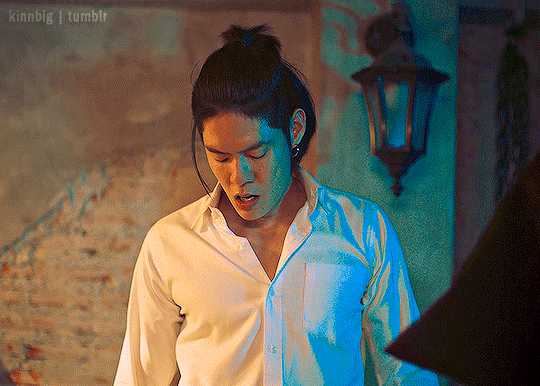
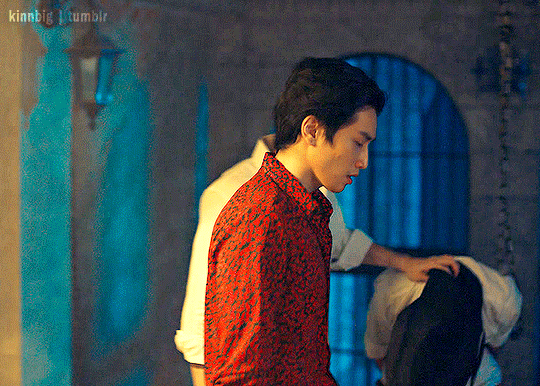
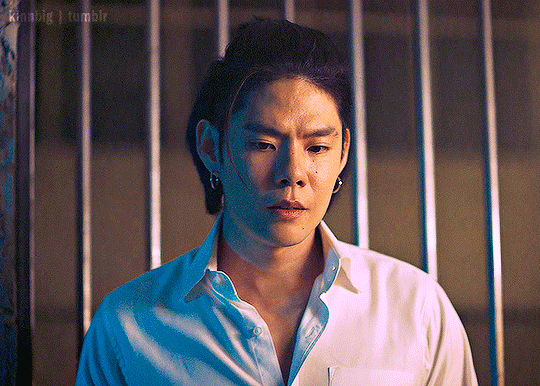
"are you going to talk or not?"
KP Anniversary | Underrated Moments [3/?]
#i just think big should have been allowed to just go feral and beat the shit out of more people on screen!!#ik this scene in general is not underrated there are many excellent gifs/fics/meta about vegas and pete in this scene#but not enough love for BIG MY BESTIE BIG#he is sooo angy and sooo pretty!#kinnporsche#kinnporsche the series#big kinnporsche#big kp#nodt nutthasid#kpappreciation#kpanniversary#kinnporschesource#darcey.gif#darcey.txt#kinnporsche.gif#bl.gif#asiandramasource#uservik#taggingmarion
297 notes
·
View notes
Text
From the person who brought you unhinged JJK S2 fish discourse, please accept my humble new offering: me holding up images whilst screaming ferally at you: did ya see?! did ya see what they did with the colour symbolism in episode 4 and what it Means?! Well dw cause I'm here to serve you a heinously long meta-analysis regardless. This episode has completely undone me and I need to give you a blow by blow account of why
I want to go in depth about the final scene of e4 bc that's really what set the cogs whirring in my mind, but let's start with the following image bc it exemplifies everything, not just in terms of the colour symbolism but of the heartbreaking changing relationship of stsg

Throughout the previous episodes and opening/credits of S2 we have been made to associate the colour blue + lightness with Gojo and the colour red + darkness with Geto. The sparkling blue eyes and stark white hair of Gojo, his Limitless: Blue technique, the white fish, the way he is often shown standing/walking in the light, turned to face Geto versus the black hair + dark eyes of Geto, the black fish, shown standing/walking in the shadows, turned away from Gojo (etc etc)
Yet the final scene of e4 flips this on its head and what this Means is, quite frankly, soul destroying
We join Geto as he walks along a dark, narrow corridor flooded with red light until he reaches heavy doors. He's confronted with his own image, reflecting back at him, before using both hands to prise open the door. When he steps into the bright white light of a high-ceilinged room, his face falls as Gojo emerges like a messianic figure from the applauding crowd, carrying the shrouded corpse of Riko (side note: god I have a lot of thoughts on Gojo as a messianic figure but I'll save that for another time)
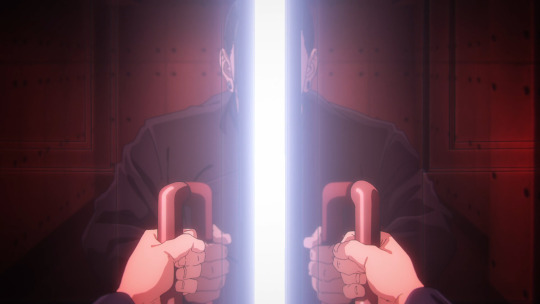
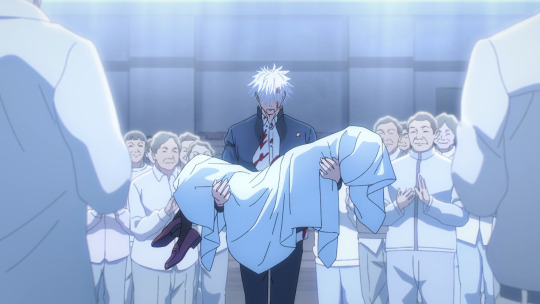
Gojo approaches Geto with his head bowed (whereas usually he is always looking up at Geto) and the moment Geto lays eyes on Gojo he knows something is wrong (similarly to Toji earlier in the episode). He barely seems to recognise Gojo and though Gojo's eyes still sparkle with their bright blue infinity, his expression is dull and lifeless. Geto asks disbelievingly in a way that stabs me right through the heart: "Satoru. Is that you?"
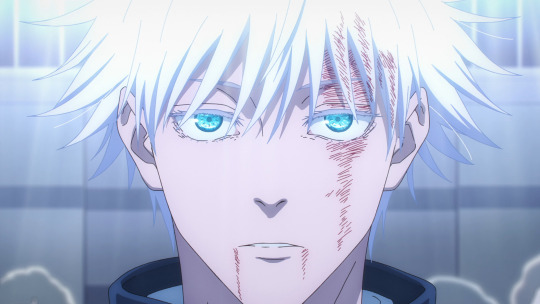
At the start of the conversation, the camera pans from Gojo on the left to Geto on the right and is shot from below in a way that emphasises the growing cavernous expanse between them
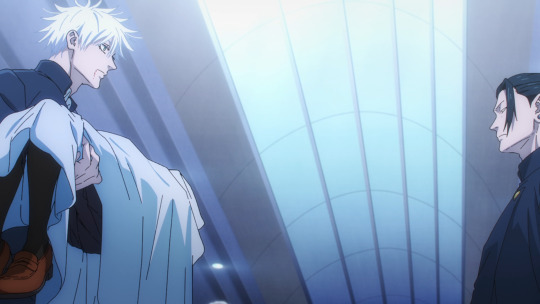
But it's what happens in the following moments that's really the killer
Gojo states that he fucked up and that everything that has happened is therefore his fault. Geto tells Gojo "let's head back" (I read this both as: let's head back home and as an indication that Geto wants things to go back to how they were). The camera then cuts to Gojo's mouth as he asks flatly - "Suguru, should we kill these guys?" - and then zooms out as he continues - "The way I feel right now, I doubt I'd feel anything about it." The camera zooms out, showing Gojo standing in front of the applauding crowd, holding Riko's body and continues to draw back, making Gojo seem as if he's getting further and further away from Geto, as well as from us, whilst his eyes glow ethereally
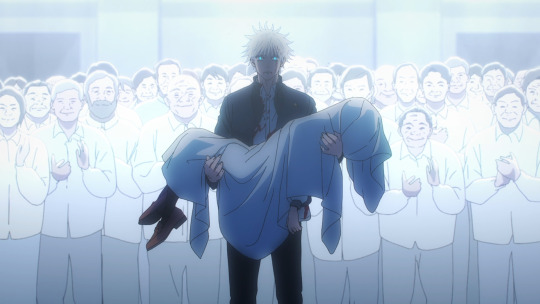
I want to do a separate post about what happens with Geto, Gojo + their relationship in episode 5 but I do also want to point out here: this is the scene that Geto experiences invasive flashbacks of in the following ep. It's the moment that he realizes that he's lost Gojo, that Gojo is now fundamentally different in a way that Geto doesn't recognise or understand, that Gojo is far beyond his reach
As Gojo walks past a motionless Geto, away from the light and into the darkness, we cut to Geto's downcast eyes, pupils dilating wildly as though he's in shock/about to cry (this harkens back to the fish, the way that Geto can no longer bear to look at the white fish as it swims past). We are then left with Geto standing in the bright blue-white light telling Gojo that there's "no point" in killing them, whilst Gojo replies in the darkened, red corridor "does there really need to be any point to it?"

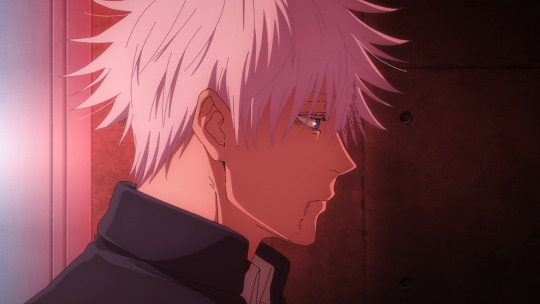
Gojo is a broken man, a complete shell of who he once was and this scene demonstrates Gojo's transition as he turns away from Geto. The colour symbolism, though, is present throughout the earlier parts of the episode and beautifully illustrates how we arrive at this exact moment (as well lays the foundations for what comes next)
Let's return to our blue/red colour theory bc there's a lot going on here during this episode!
E4 starts on a banger: we're cruelly given a recap of Toji telling Geto that he killed Gojo and then within the space of about 7 minutes, Geto too has been killed. It's tragic and sad and none of us want to be reminded of it but I'm going to (srysrysry) because hey, check out what's going on. Notice the cool blue tint of Geto's "death" versus the vivid red of Gojo's? (a horrible eg I know but you should've heard my scream when I caught onto it)
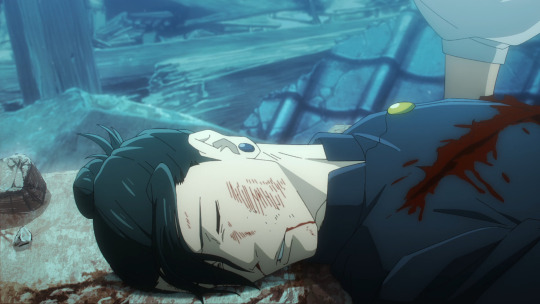
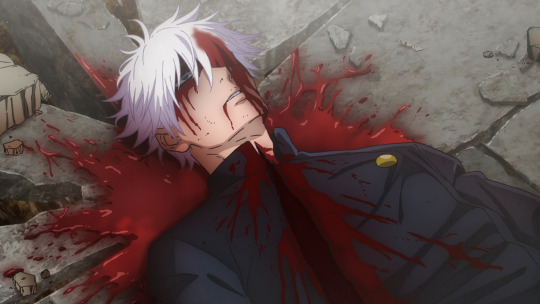
And here's another cool example that had me ajdjsksjdk bc ofc I clocked Gojo using his red technique, but look at the blue glow around Geto's hand?! I don't recall seeing it being used for Geto before (correct me if I'm wrong) so it's interesting to see it being used here, plus us seeing Gojo using Red properly for the first time
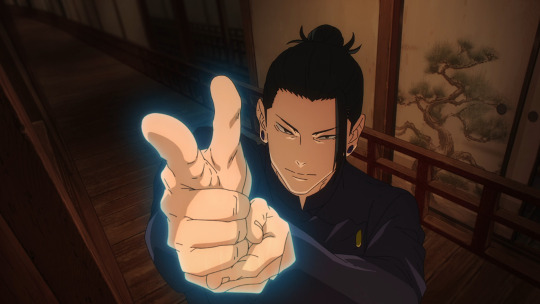
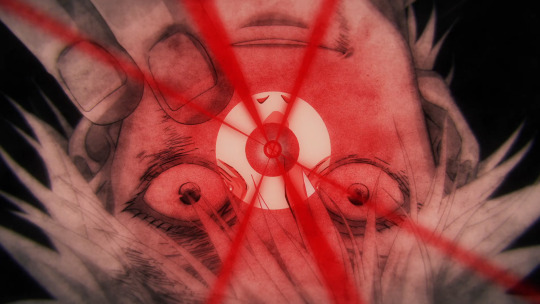
Let's just pause here for a moment bc this is a hugely important moment for Gojo's character arc and the fight with Toji gives us an incredible colour theory moment
In the previous episodes, we've seen Gojo being able to easily use his Limitless Blue technique but remember how, in E2 Gojo tried to use Red and hilariously fucks it up announcing "I failed" and resorts to punching the bad guy instead? It isn't until this episode, after Gojo has used reverse cursed technique whilst on the verge of death to heal himself (idk if heal is the right word) that he is able to learn to use Cursed Technique Reversal: Red
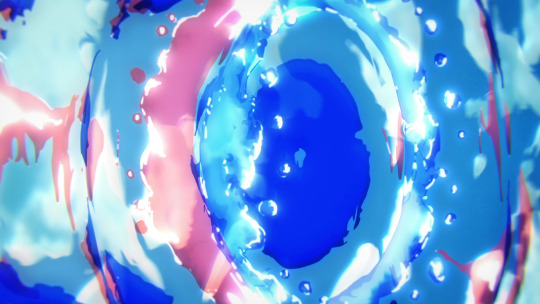
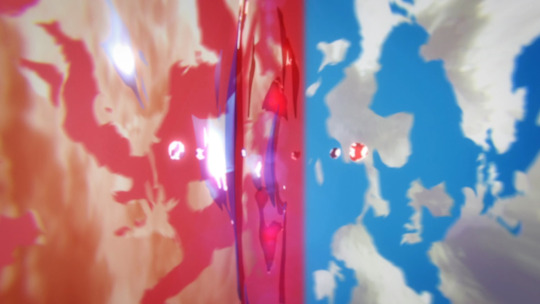
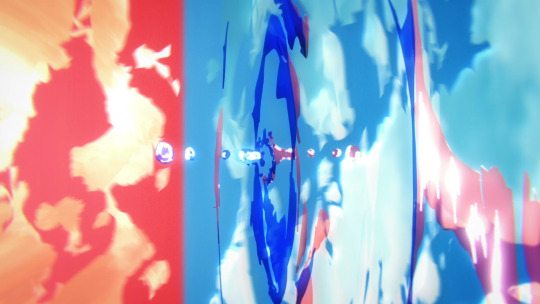
We have this really beautiful animation sequence during Gojo's fight with Toji. A blue and a red droplet swirl around each other and then splash together to reveal a swirling rotation of blue and red rippling water. The colours converge, red droplet slipping into blue water, blue droplet into red. The droplets come together to form the shining purple infinity plucked between Gojo's fingers, granting him the "Hollow Purple" technique that allows him to blow a hole through Toji.
Gojo explains:
"Reverse cursed technique uses negative energy. While it can enhance the body, it can't regenerate it. Multiply that negative energy against itself to create positive energy... Take the amplified and the reversal, then smash together those two different expressions of infinity to create and push out imaginary mass."
Gojo + Geto, amplified + reversal = two different expressions of infinity -> create / push out
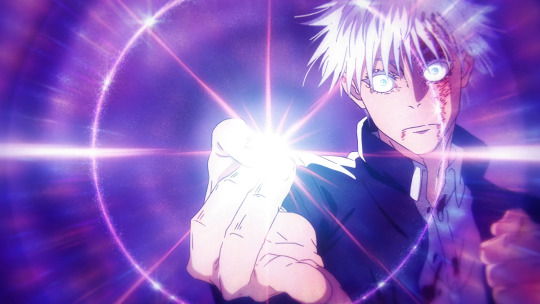
Toji "killing" Gojo was the moment that set Gojo on a different path, which allowed him to evolve beyond belief and causes him to ascend to, what he believes is, divinity. He takes the basics of Blue and Red (primary colours; Gojo and Geto) and mixes them together to create something new, something transcendent, something that surpasses who he (and Geto) were before. He becomes an unstoppable power that far surpasses everyone else, and this is what Geto recognizes: that Gojo has evolved without him (which we know from E5 has huge consequences for Geto's thinking)
And so now, finally, let us return to Geto at the end of E4
After Gojo asks Geto "does there really need to be any point to it?" (killing), the camera flashes quickly between the applauding audience and Geto's empty hand, which he then clenches into a tight fist. He raises his downcast eyes to look forwards (resolutely, looking into the future) and responds: "it's very important there is..."
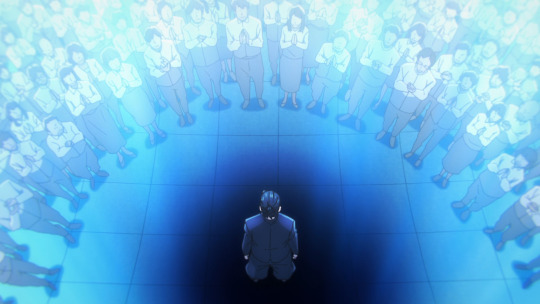
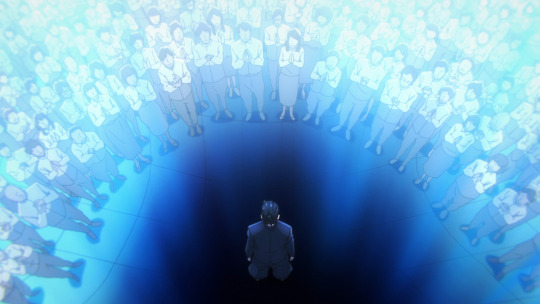
We're left with the image of Gojo standing on a blue floor, surrounded by the clapping crowd. The floor wavers as an all consuming darkness pulses beneath him, locating Geto as it's central point as it surges out towards the crowd "...especially for a jujutsu sorcerer."
We're reminded of the conversation where Geto and Gojo almost come to blows whilst playing basketball in E1. Geto's argument that jujutsu sorcerers exist to protect non-jujutsu sorcerers whilst Gojo complains about having to protect "the weak" + patronisingly tells Geto to get off of his moral high horse.
Now we witness the extent of Gojo's apathy in action, as he pulls away from everything and everyone, and the swinging of Geto's moral compass from protection to genocide as he's left behind in the ruins of all that once was, of everything and everyone that he loved
#goddddd this gave me brain rot for about 6 hours?!#idk if people will appreciate it as much as fish discourse but FUCK I needed to just get it out of my system bc it's driving me insane????#these two are making me + a good chunk of the internet unwell but i'm glad we can all be unwell together#also I have A LOT more to say about gojo geto + stsg more generally so I might continue to inflict long-winded meta analysis onto tumblr#like BOY do I have a bunch of shit I need to say about e5 so I guess that'll be another 5-6 hours of my life spent on that#rrp analysis#stsg#satosugu#gojo#gojo satoru#geto suguru#jjk colour theory#jjk fish discourse#geto#jjk#jjk season 2#jjk s2#jjk s2 e4#jujutsu kaisen season 2 spoilers#jujutsu kaisen season 2#jujutsu kaisen
201 notes
·
View notes
Text
I'm bouncing around a larger post about Nishiki and the mortifying ordeal of being known, but in the meantime I'm thinking about Nishiki and Kiryu and how the clothes make (or don't make) the man. Like, beyond my visceral horror that Kiryu begged Nishiki to pick out a safe and boring suit for him in Y0 and then said he was envisioning something purple with gold stripes.
I'm thinking about Nishiki's incredible sensitivity to image and his need to control how he's perceived. I'm thinking about Kiryu's inability to let go of the past. I'm thinking about how KIryu dresses like who he thinks he is, and Nishiki dresses like who he thinks he wants to be.
There's some interesting incidental dialogue between Nishiki and Kiryu in Y0 while they're en route to the men's suit store. I wish it wasn't so easy to miss, because there's a lot to unpack here. (I'm just transcribing the English in-game subtitles here; I don't speak Japanese so I have no idea how loose vs. direct the localization is in this part.)
NISHIKI: …now that I think about it, you've been dressing like an old man since we were kids.
KIRYU: Have I?
NISHIKI: Yeah. The few times we got to pick our clothes, it was always like, "you're choosing THAT?"
NISHIKI: I wouldn't say you're a plain guy…You'd pick shirts with weird prints though.
KIRYU: Guess I forgot all that. It's weirder to me that you haven't.
NISHIKI: Well, confession time. You're why I started caring about fashion. I swore I'd never go out dressed like you.
KIRYU: Come on, I'm not THAT bad. [we have already discussed why kiryu is, in fact, that bad.]
NISHIKI: [laughing] Aww, did I hurt your feelings?
NISHIKI: Well, this time you've got me with you. I'll see my bro gets taken care of.
KIRYU: Heh. What an honor.
NISHIKI: Leave it to me.
Nishiki doesn't bring up Sunflower Orphanage much; when he does share memories of his childhood, those memories are kind of painful (see: "do orphans not get to dream?"). Kiryu's surprised that Nishiki remembers how they dressed as kids, but it makes sense that wearing a limited selection of hand-me-downs stuck with Nishiki so strongly. His clothes announced his poverty, and they weren't even his -- he had to share them with the other orphans, so what he wore showed he belonged to yet another stigmatized group. And I'm sure people picked up on those visual signals, especially other kids. Kids can be vicious, and appearance is an easy and immediate target! We don't know for sure how young Nishiki interacted with his peers and teachers, but given what the Morning Glory kids go through in Y3 (and given, like, everything about Nishiki), he probably didn't have a great time.
Kiryu frames his childhood as poor but loving, and places much more emphasis on the latter. There might be some rose-colored glasses at work there -- let's look at the flashback where Kazama tries (and fails) to violently dissuade Kiryu and Nishiki from joining the yakuza.
KIRYU: I owe you everything, but this isn’t about that. [...] We’ve looked up to you for all this time. Your car. Your confidence… The way everybody bows to you. We idolized you. I want that life, too. Is that so wrong!?
Nishiki doesn't really speak in this flashback, but like, Kiryu uses "we" enough for us to draw some obvious conclusions about Nishiki's own motivations. That being said, I don't think Kiryu's being dishonest or disingenuous when he describes his childhood as happy, and himself as well-loved. He's not ashamed of his upbringing, and he doesn't hide where he came from. Nishiki seems to have the inverse view. It's not that he doesn't love (at least some of) the people he grew up with, but what comes up first for him is what he didn't have. He didn't have money. He didn't have respect. He didn't have a cure for his little sister. He didn't have a lot of choice, right down to the clothes he wore.
(There's a whole other essay here about why Kiryu's and Nishiki's perspectives diverge on this, but I'm trying to limit the scope of this post. Suffice to say that, while I don't think game canon gives a timeline, I do think Nishiki was a little older when his parents were killed -- old enough that he actually remembers them, at least.)
The same mindset fuels Nishiki's interest in fashion. Yeah, part of it is that he's ribbing Kiryu, but I think it goes deeper than Kiryu wearing ugly shirts. Nishiki doesn't want people to look at him and see what's missing. Fashion isn't a means of personal expression for him, really. It's a message. It's the interplay of knowledge and resources and presentation: knowing what clothes read as successful and trendy and expensive, being able to afford those things, and convincing people that your successful important outfit makes you a successful important person. And he's not wrong about the social dimensions of fashion.
NISHIKI: Try sporting a suit that runs 500 grand for once. Trust me, you’ll see the world in a whole new light.
KIRYU: Fashion’s not my thing. Besides, Kazama-san never wore flashy clothes.
NISHIKI: You do realize he’s the family captain, right? Number two in the whole Dojima operation? You get to that level, you can wear whatever you damn well please. But for the rest of us, “flashy” is part of the business.
KIRYU: So that fancy new car you bought was just “business”.
NISHIKI: Yeah, and that fancy lighter of mine, too. Which you still haven’t given back.
KIRYU: You want to play the rich guy, quit being so stingy.
NISHIKI: But you get what I’m saying, right? People see the expensive car, the designer jacket, and the gleam of that little Dojima pin, they pay attention. A yakuza’s only as good as his image. [...] Take your buddy today. These squeaky-clean idiots, borrowing money just to blow on tits and booze… Nobody in this town gives a crap about substance. What you see is what you get.
That's our first take on one of the major themes of the game: what does it mean to be yakuza? Again, there is truth to what Nishiki's saying here, particularly in terms of the ethos of the eighties. I'm not an expert on the bubble era, but the worldbuilding in the game speaks for itself. People hail taxis with 10,000-yen bills. You punch money out of punks during random street battles. Nishiki keeps a personal bottle of high-end booze at a bar he's visited twice, mostly because he "can’t stand being taken for a bum." The act of spending is important, not what you're spending it on.
Nishiki's outfit in Y0 is perfectly suited (heh) to that outlook. And look, I might be inviting controversy here, but in context, I think it's a werq. Yes, it's loud. But the silhouette -- squared shoulders, single breasted, thinner peaked lapel -- is right on trend for the time period, and it fits him well. The colors look good on him. The bold pattern (no, it's not animal print) under the solid maroon is a risk, but he pulls it off. And excess aside, he knows when to pull back on the accessories. It's bright and confident and memorable, and boy would Nishiki like to be all of those things.
Also -- and importantly -- Kiryu would never go out dressed like that. Because we can't talk about Nishiki and Kiryu without talking about Nishiki's Mt. Fuji-sized inferiority complex. Mastering image doesn't just make Nishiki stand out; it makes him stand out from Kiryu. Let's go back to the beginning of the game.
NISHIKI: I’ll admit, though, you’re finally starting to look the part. You make a pretty convincing yakuza. You’re done with collections today, right?
KIRYU: Yeah.
NISHIKI: Good. That should put Kazama-san’s mind at ease a bit.
KIRYU: Heh, dunno about that. But he always knew all I could do is fight. You’re the one who’s good at the dance.
Nishiki then calls attention to the "rags" that Kiryu's wearing, which...is not an unfair assessment. (TUCK IN YOUR SHIRT, KIRYU. HEM YOUR PANTS.) As the two of them walk around Kamurocho, Nishiki offers Kiryu plenty of hot tips, from meeting girls to making big bucks to cozying up to the brass. But even when Nishiki's opining on his area of expertise, there's a competitive edge to it. "You asking me to pick out clothes for you means you admit you have terrible taste," he tells Kiryu on the way to the suit shop. Kiryu tells him to shut up, but there's no actual hurt behind it. Kiryu doesn't really care that his taste in clothes sucks. Fashion isn't important to him. Most of the things Nishiki knows so much about don't really matter to Kiryu. And that makes Nishiki feel more insecure! Because if Kiryu rolls out of bed looking like a yakuza, if Nishiki's image counseling sessions aren't helpful or meaningful, if Kiryu can skip the dance and get to the top on the strength of his fists and convictions, then who cares about Nishiki's 500 grand suit or his hourlong hair care routine? If image isn't what makes a yakuza, what does that make Nishiki?
At the end of Chapter 6, Nishiki tries to look out for Kiryu again -- this time, by granting him a merciful death before the Dojima Family drags him to the Hole. It's one of my favorite scenes in the game. Nishiki's crying too hard to aim the gun properly; Kiryu tells him to man up and shoot. Finally, Nishiki collapses.
NISHIKI: Can’t do it… How could I shoot you!? Without you, I’ll always be nothing. Can’t make it as a yakuza… No. I wouldn’t even still be alive now if I didn’t have you beside me! I’m just… If you’re not with me, I’m useless! Nothing means anything!
Mastering image hasn't granted Nishiki anything of substance. At the end of the day, Nishiki's playing dress-up, and he knows it.
And I'm almost certainly getting into overthinking-this territory now (if I haven't gotten there already), but I kind of like the spin this puts on Nishiki ripping his expensive suit off in Chapter 14 when he decides to fight the Dojima Family at Kiryu's side. Like yes, ripping off your outer layers to get at the naked (so to speak) truth -- your irezumi, and what it represents -- is just Yakuza Storytelling 101. It's decisive, it's kind of dumb, it's great, it gets me hyped every time. But I like that Nishiki's honest answer to "what does it mean to be a yakuza?" isn't about looking the part. I am genuinely trying not to end this paragraph by saying that Nishiki must become like a dragon, but like...you get where I'm going with this.
Of course, Nishiki's back to playing dress-up in Y1/Kiwami. I'm not the first to call the Patriarch Nishikiyama look a glow-down (though I like the patterned white tie). Like, fashion-conscious Nishiki would look good in a Hedi Slimane/Tom Ford-esque skinny black suit. But he picks a silhouette you'd expect to see on a much older man, torso-swallowing pants and all. The slicked-back hair doesn't help. He's just so transparently trying to look bigger and broader and older, and he doesn't pull it off. Big Bad Patriarch isn't a good look for him, in any sense of the phrase.
A final thought: Kiryu's clothes, and Nishiki's commentary on them, are the subject of their first conversation in Y0 -- and of their last. Kiryu's costume progression in Y0 is a pretty obvious commentary on his journey, to the point where Kiryu and Nishiki explicitly call attention to the color connotations in their final exchange. As a Dojima grunt, he wears black, and it doesn't look good on him because "brutish thug who keeps his head down and does what he's told" isn't a role he's comfortable with. He wears white when he works in real estate, but the change in color isn't enough to sell anyone on his transformation into a civilian. Although it's a little rich for Oda "Red Clown Shoes" Jun to chide someone for not wearing a proper suit. At the end of the game, Kiryu's in his classic grey suit, and well, the game spells it out:
KIRYU: I’m not feeling black or white these days. This is where I’m at right now. I chose it myself. I’m making it a fresh start.
NISHIKI: Fine, fine. See if I care! Wear it the rest of your life!
Nishiki, dismayed, tells Kiryu that the grey suit already looks dated, but for Kiryu, "fresh start" doesn't mean "on trend". His image might be out of step with how other yakuza view themselves, or want to be seen, but if he's always going to look like a yakuza, he might as well stake his claim on what being a yakuza means. Still, it's telling that, even as a young man, Kiryu looks like a throwback to an earlier era. As the series progresses, the games hammer this home more and more. How many antagonists tell Kiryu that he's out of touch with the modern world, that he represents a version of the yakuza that no longer exists, that it's time for him to make way for the next generation?
"Wear it the rest of your life!" is a funny little in-joke, yeah, but...it's a little sad when you think about it, isn't it? Kiryu gets new outfits from Y3 on -- and in every game, he ultimately puts the suit back on and heads to Kamurocho. It's exactly of a piece with how Kiryu views being yakuza. We, and he, can debate the exact extent of his retirement from the Tojo Clan's affairs, but the yakuza isn't a career for Kiryu, it's a set of beliefs he carries with him. He wears the suit the same way he wears the dragon on his back: as an indelible part of his self-image.
#yakuza#ryu ga gotoku#yakuza meta#kiryu kazuma#nishikiyama akira#kazuma kiryu#akira nishikiyama#i've been poking at this thing intermittently for months but a certain tournament really got my mental gears going again#yakuza's just really fun to put under a microscope#i'm interested in the way the games do things even when i don't like what they do#(although to be clear i *do* generally like how rgg dresses its cast)#(even the outfits i make fun of are usually like...coherently delivering a statement about the character wearing them)#genuinely did not think i'd spend so much time writing this but hey#maybe i'll do these kinds of posts more than like...biannually...if they're sufficiently interesting#meta
264 notes
·
View notes
Text
Can we talk about The Dying Swan moment in Coda? As someone who was once a very serious ballerina, I need to talk about the Dying Swan. Here's your context --
CHAKOTAY: Harry's clarinet solo was okay. I could have done without Tuvok's reading of Vulcan poetry. But the highlight of the evening was definitely Kathryn Janeway portraying the Dying Swan.
JANEWAY: I learned that dance when I was six years old. I assure you, it was the hit of the Beginning Ballet class.
Have you seen The Dying Swan? It is dramatic.
Here, take a minute:
youtube
First of all, this dance is much too advanced for a six-year-old, even if they’re doing it in demi pointe. (Six-year-olds emphatically should not be in pointe shoes btw.) The dance is almost entirely bourees and arm movements done to very subtle musical cues, not the foundational ballet moves typically taught in Beginning Ballet.
This is a very vulnerable, dramatic dance that is effective because of its subtleties. The performer would need to embody that vulnerability in some way for a convincing performance. It's short, but it's a solo piece -- all eyes on you. I mean, it was choreographed for a prima ballerina, BUT THAT'S NOT MY POINT
Can you imagine our unflappable Captain Janeway willingly getting in front of her crew to do this ballet? I get that it’s thematically relevant to the plot of Coda, but since Janeway is only vulnerable in front of her crew when it means putting herself in harm’s way, it seems like a wild decision. She tends to hold herself apart from her crew, maintaining the professional distance of the captain. Further, when she does any creative pursuit, it is almost always in private, since her sister was the artist in the family and she was the scientist. As a captain, she commands Voyager in a much different way than she would as a dancer with this piece. I'm not saying she never shows vulnerability because she definitely does, but not necessarily in this way. Then when she talks about it with Chakotay, she just casually brushes it off with a laugh like no big deal.
There’s also the question of costume – would she have gone full tutu? Done it in her Starfleet uniform? An impeccable yet flow-y white suit? She does get into costume and command a performance in Bride of Chaotica!, but Coda is still kind of early days for our captain. Arachnia aligns more with what we know about Janeway's character.
Granted, it is Chakotay laying down these complements about her dancing ability and he is clearly biased. To be fair, Neelix does too before they leave in the shuttle. If she did this dance and performed it poorly or amazingly, I feel like the crew would look at her a bit differently afterwards.
Canonically she did The Dying Swan, but I certainly have trouble picturing it happening.
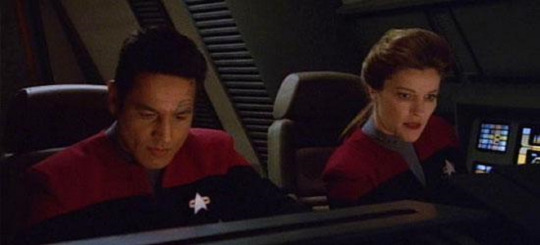
#does everyone let it slide because she gets mind killed a bunch of times and attends her own funeral?#this throw away line has been living rent free in my mind for months now#coda is also a ballet term fun fact#star trek voyager#coda#Captain Janeway#this death doesn't mean anything though because no one else is saved so not janeway self-sacrificing goals#yes yes they probably just picked the first artistic performance with death in the title cause it's thematically relevant#i've thought about it much more than a normal person probably should#No one said I was a good ballerina but I did it for a long time#may or may not have filmed a video about this in my cosplay for a different platform#maybe have been sitting on it cause of editing and weird dudes being into me like why no#also let tuvok read his poetry i bet it's great#alien grim reaper dad is a great concept very creepy bring him back for more angst#just a little insane about the dying swan don't mind me#also insane about coda and voyager and janeway in general ok you got me#meta#I was falling asleep on the couch but then I had to rant about coda I’m sorry
85 notes
·
View notes
Text
li xiangyi was the sun to qiao wanmian and the moon to di feisheng. and both of these metaphors exist in canon dialogue. head in hands
#IM GONNA BE WRITING MORE ABOUT QWM AND DFS TRUST ME ON THIS#part of it is in the gendercoding meta but part of this is just in general i am CHEWING on these dynamics#mysterious lotus casebook#li xiangyi#qiao wanmian#di feisheng#ashton originals
76 notes
·
View notes
Text
Okay, a good amount of time has passed, and after having seen this post by @weretiger-be-my-horse , I've been turning it over and over in my brain going absolutely feral over this concept. I need to expand upon my thoughts on this idea and all the evidence there is pointing towards it, whether that be actual tangible things, or purely strong vibes I have.
First of all, full disclaimer: I did not like the season 5 finale, and how it wrapped up the DoA arc. To say that I "disliked" it is putting it extremely lightly, in fact -- I absolutely hated it, and I am still, to a degree, in disbelief that I actually even watched those 24 minutes with my own two eyes, and that it somehow wasn't a complete fever dream. While I'm not going to go in long-winded detail into all the ways that I feel like the finale almost completely bastardized all of its featured characters and destroyed any and all buildup we've had going on in this arc for 50 some chapters now, because that's not the main point of this post, I will not make any attempt to hide the fact that the theory-crafting I'm about to pose here is partly influenced and prompted by how much I hated the finale, and how much I desperately hope that it will not end up being manga canon. Therefore, if you enjoyed the finale — and that's fine! — and don't want to read any negativity about it, then I would not recommend reading any further (I mean, you've probably already left by this point, which is fair lol), While obviously it's important that I be as objective and unbiased as possible when explaining my thoughts, some of my negative feelings about the writing will be a part of this analysis, even if this isn't going to be a full-blown rant. Just know that if you proceed.
With that out of the way, let me continue.
So. In the aforementioned post, the theory presented is that the anime may be operating on an alternate timeline, and that this will become evident once we read the upcoming October chapter, wherein things will go completely differently post-chapter 110 than they do in the final episode — probably for the worse, with the s5 finale intending to lull us into a false sense of security and make us assume that everything in the manga arc finale will wrap up as smoothly and consequence-freely(? lol) as it did in the anime one. It also suggests that the Fukuchi we see at the very end that sskk are fighting came from the manga timeline, where he won, and that he used the Book to jump to a timeline where he lost, the anime one, proven by the fact that this Fukuchi is wearing a mask with the same design on it as the mask Fukuchi is wearing on the chapter 110 DoA color spread/title page.
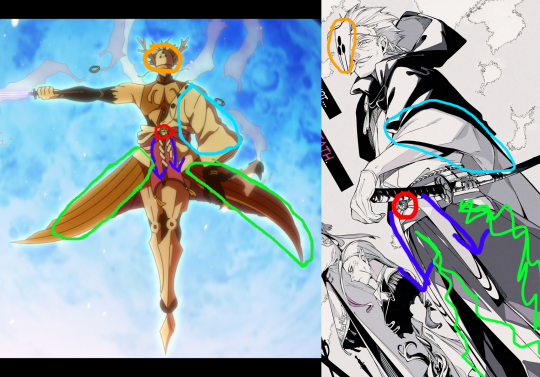
First of all, I want to note the fact that it's not just the mask design that's the same: the entire outfit is roughly more or less the same as well. It's not completely 1-to-1, because the anime can never fully match the intricacies of Harukawa's beautiful outfit designs, and the Fukuchi in this scene has the kimono half-off because of the... super saiyan mode he's in, but most all of the main pieces of clothing are there. Any small inaccuracies could also be attributed to the fact that Harukawa probably didn't have this finalized art ready back when this episode was being made, so the animators wouldn't have had the complete design to work off of. But in general, because it's all so similar, I think we can quite confidently say that the ending episode Fukuchi is meant to be the one from this manga art.
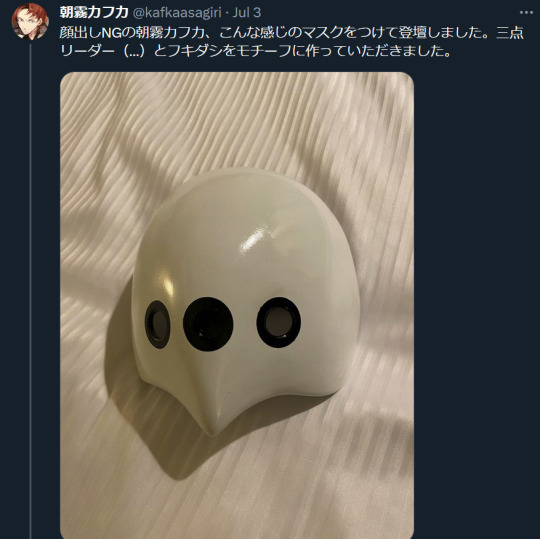
Also, people have pointed this out, but it's worth mentioning that the mask Asagiri wore at Anime Expo in July was referencing this Fukuchi. It's not a crucial detail, but it just proves more that Asagiri is a gigantic fucking troll, and that he clearly wanted to draw attention to this Fukuchi design. It's important. He describes the mask here as made in the motif of an ellipses inside a speech bubble... could that perhaps be referencing meta aspects, like the Book?
Next, I want to talk about the even bigger elephant in the room, which to me is the most damning and undeniable piece of evidence there is of the anime operating on a completely separate timeline from the manga:
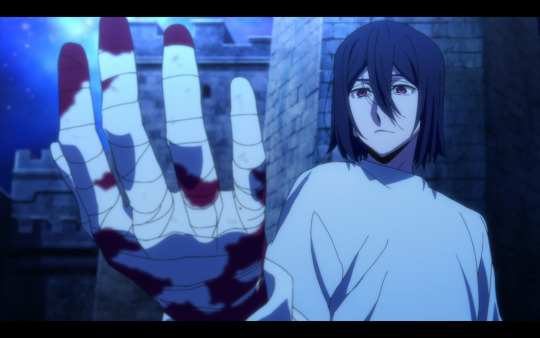
This Fucking Hand™️
As we all know, in the anime, Fyodor injures his hand when the password input device blows up, and as we all know, this does not happen in the manga. In the last episode, Dazai claims that the final nail in the coffin of his impromptu plan to kill Fyodor relied on this hand injury: because Fyodor couldn't pilot his escape helicopter himself, he would ask one of his Meursault vampires to do it for him, unaware that Bram and thus this vampire was now on the ADA's side, and said vampire could kill him while his guard was down.

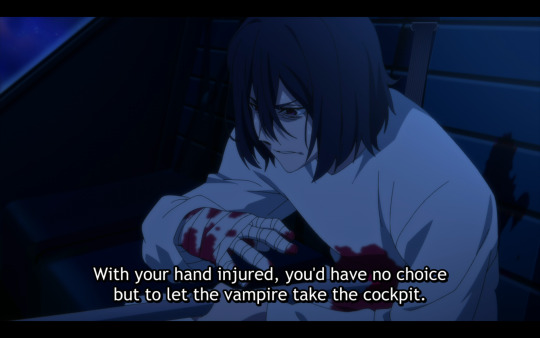
Ignoring how utterly stupid and contrived this plan is when you stop and think about it for more than two seconds, the fact of the matter is that something that initially seemed like nothing more than an odd but inconsequential anime original addition ended up snowballing into being the entire reason one of the big bads was brought down. If Fyodor hadn't hurt his hand, he wouldn't have needed another pilot, and so the traitor vampire wouldn't have had an opportunity to get near him and kill him without him expecting it even though said vampire was presumably with him as they were leaving Meursault, and was probably already a traitor by then, so there was plenty opportunity for him to still die. not to mention by Chuuya's hands at literally any time he wanted to, because Chuuya was coherent the whole time. Also there's absolutely no way Dazai could have known exactly what Ranpo would do, no matter how smart he is and how much he trusts him. idk it's fucking dumb, just roll with it. Therefore, putting aside all other variables for now, we can conclude that, on the most basic level, this signifies that no hand wound = no death.
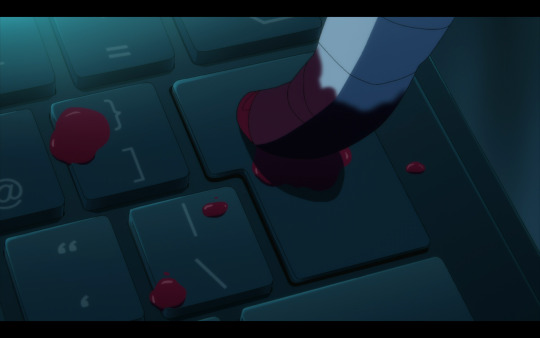
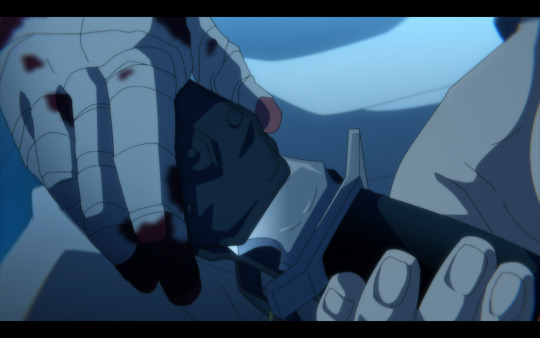
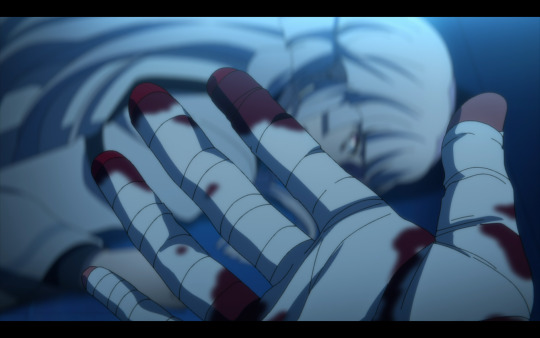
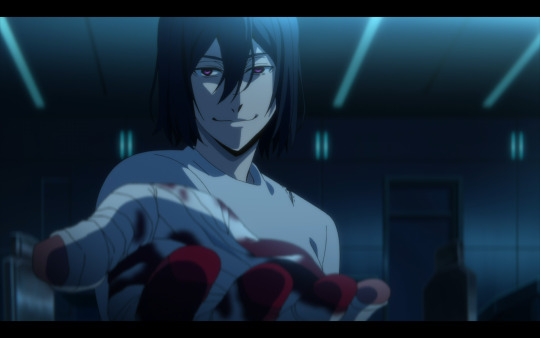

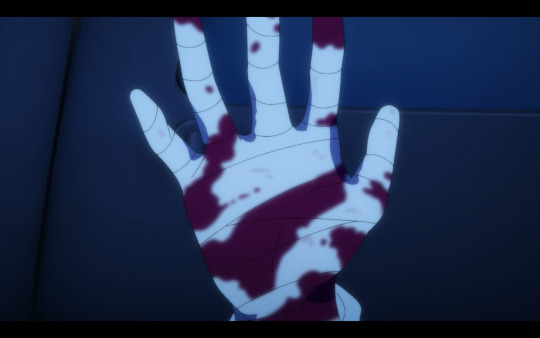


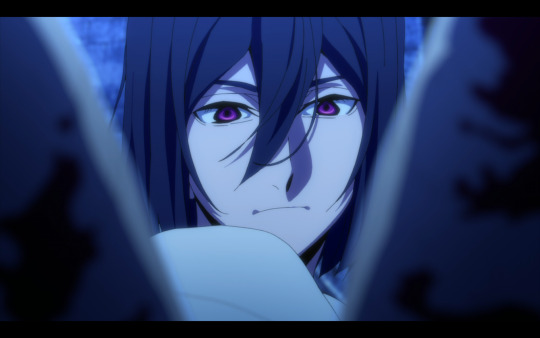
And let me tell you, this hand wound bothers me. It really, really does. Because they focus on it a LOT — they go out of their way to draw attention to it MULTIPLE TIMES, from the moment it first happens to the end of the season. Fyodor even talks about it to himself, about Dazai being able to cause him tangible, visible, bodily harm, (something that, again, as far as we've seen, has never happened in the manga). Hell, even after Fyodor's death, they're still drawing attention to it, because his right arm is all of him that survives, and Dazai picks it up and gives it to Nikolai to do his hilarious sad little gay fondling of it played completely straight even though there's nothing straight going on here at all! It's like it's a big red flashing sign at all times going "you see this injured hand? This is important. Are you picking up that it's important? Are you taking note of it?" Why is that? Obviously, it serves to give us the lore crumbs about Fyodor and "that man", but that's hardly the main, much more glaring reason, as I've already mentioned.
Fyodor doesn't hurt his hand in the manga. Fyodor won't die here in the manga. I am so dead serious by this point about this, and it's not just simply the fact that this was absolutely not at all the time for him to die, or the fact that his hand is the reason for his death in the anime in and of itself, but how much EMPHASIS they place on this, and on the hand in general. What would be the point of adding something like this, if it's not meant to alert us to the fact that it has a major impact on how the story plays out? We all know Bones: they struggle to get right and include everything that's already there in the source material; they would never go out of their way to add something this noteworthy if there wasn't a very good reason for it, if it wasn't absolutely necessary. I've seen a few people bring up the fact that Fyodor gets shot in the shoulder by Sigma and that that could lead to the same outcome in the manga, but I disagree: although he has blood on his shoulder in the manga, it seems like the bullet just grazed the top of it, because his arm and hand appears completely functional afterwards (not hanging limp by his side or anything). But that doesn't even matter, because this isn't even about the semantics/logistics of how the hand wound caused Fyodor's death because again, it's a stupid outcome, or what could serve as a substitute in the manga — thematically, this is a textbook example of the butterfly effect. Countless parallel universes exist within this series, ones where even the most minute differences lead to a majorly different outcome: this just happens to be one of them. There's no reason to think it isn't, and there's no reason to not think that the anime wants us to clue into the fact that things only went as smoothly as they did on the Meursault side because of this wound; in other words, that things will go very differently in the manga thanks to the absence of said wound. They wouldn't have added it in the first place and put such clearly deliberate emphasis on it otherwise.
Things are going to happen very differently in the manga, at least when it comes to the Meursault crew (but then, if you assume that, you then naturally assume it all will be very different). This is the only conclusion one can come to with the presentation of this anime-only wound, combined with the fact that parallel universes are a very real thing in BSD.
I'm going to go on a bit of a tangent, so bear with me. I play a lot of visual novels, and although such concepts aren't really as original now as they were a while ago, some of my favorite and some of the very best VNs out there are the ones that break the fourth wall and make the visual novel branching route format directly intertwined with the story: you know, the ones where the characters go "if only I had done things differently, maybe everything would have turned out better...!" in a wink wink nudge nudge moment, and the ones where the characters are aware of the different timelines, even, or even have the ability to gain information from their selves in said alternate timelines to influence events in their current one (I'm intentionally not naming the games I'm thinking of for the sake of spoilers, but if you know, you know lmao). It gets very meta in this regard, and this is how I started viewing BSD through the lens of ever since I first learned about Beast: like a visual novel with many branching routes, and only a few routes that feel entirely "right".
When I first read Dazai's Entrance Exam, I was struck by how unnerving the ending sequence in the abandoned hospital felt. Obviously, Kunikida's internal struggle over Sasaki's actions and motives is him still desperately clinging to his ideal world that does not exist, but the specific type of phrases he uses — "who is wrong?" "[who is] the cause of all this?" "there has to be an ideal world" "there has to be something, I'm sure of it" "There must have been something we could have done!" — and the framing of the scene in general, is eerily reminiscent of a bad ending in a visual novel, to me. There's a haunting, looming, bleak sense that a different outcome could have been achieved, if different decisions had been made, or if things outside of anyone's control had been different... and we know that this is true, because in Beast alone, Kunikida never goes through the Azure Messenger incident, because Dazai doesn't have his entrance exam. Hell, you could even consider the anime's version of the Azure Messenger arc an alternate timeline in of itself, if you really wanted to, long before we even arrive at season 5.
When it comes to Beast, this timeline has almost the opposite feeling of what I described above, that I've also encountered in visual novels: the idea of a "good route" or "good ending" that still doesn't feel quite earned, or as perfect as one would expect. Beast is presented as the "ideal" timeline purely for one sole reason: Oda is alive. It is the only timeline where he's alive, and keeping Oda alive is the ultimate goal Dazai wants to achieve, the only reason this timeline exists; therefore, disregarding all else, Beast should be the best timeline, because Oda's death is the greatest devastation in the series to date. We all want him to live, so why wouldn't the timeline where he does be the best one? And yet... of course, it isn't. Dazai is alone, and steeped in darkness and loneliness without Oda, and dies by the end of the story for Oda's continued living. Atsushi has Kyouka still, but he's suffering and more traumatized, and unable to heal while stuck in the mafia, and neither can Kyouka. Akutagawa is living a much better life in the ADA... but without his sister, and without what he has from his bond with Atsushi in canon, that isn't replicated in Beast. And Oda... Oda is alive, and he has his children and his novel, but there is a feeling that he is aimless, that something in his life is missing. He has everything he ever wanted, but all that means nothing without what he truly needs: Dazai, and his time with Dazai and Ango at the bar. In this way, things going well and us getting what we want — in this case, Oda living — goes against how it's supposed to be, the natural order, which is why it feels so hollow. In the specific visual novel I'm thinking of here as a comparison (again, shoutout if you know), there's an alternate ending that involves you inputting information you gain at the end of the game very early on in the game, wherein the protagonist now has memories of the future and is able to bypass and prevent all of the events that take place normally. This means that people who die or are hurt somehow in general are saved from that fate, and nothing bad ever occurs; everything wraps up neatly and nicely... but again, there's an undeniable, unsettling feeling of emptiness, of a victory that rings hollow, because what's the point if everything is simply handed to you easily, where's the sense of accomplishment, without any struggles to achieve said victories, or any growth along the way? How can it feel earned if one doesn't have to, in Dazai's words, "scream within the storm of uncertainty, and run with flowing blood"?
You can probably already see where I'm going with this.
This finale feels weird. Really, really weird. It feels too cheap, too simple, too unsatisfying. So much so, in fact, that for almost the entire runtime, as I was bombarded with resolution upon resolution one after another, I kept thinking "There's no way this can be real. Where's the catch? When is the "gotcha!" moment gonna happen? The "it was all a dream" reveal?". And this isn't just because I hated the writing, and that it really did feel like a fever dream watching fanfic levels of bad (actually, that's an insult to fanfic writers, tbh; they could do better) — no, it genuinely feels so incredibly fake. Even upon rewatching it and already knowing what happens, my brain still naturally keeps expecting some kinda of "sike, you THOUGHT!" moment to suddenly appear. It just.... feels "too good to be true". Dazai and Chuuya come out unscathed, and it's revealed that they were never in any real danger to begin with. Fyodor, one of our biggest threats, is dealt with supposedly for good (I say "supposedly" only because of the Jesus line, but if anything imo, I think that's just a hint that this won't be the canon ending in the manga, so in a sense he's going to "come back to life"), and Nikolai seems somewhat at peace with his death. The other biggest threat, Fukuchi, is also dealt with, and he and Fukuzawa get their final moment together of closure. Yes, Sigma is left in Meursault don't even get me started on how angry this alone makes me, and Fukuzawa loses Fukuchi, but overall, everything is portrayed in a positive light, and any negatives or losses are quickly glossed over. Everything is tied up nicely, neatly, and smoothly. ...And that is exactly what makes it feel so wrong, and hard to trust in.
I'm not sure if this will make sense, but to me, the finale is so incredibly poorly written that it almost feels.... intentional. It's so bad to the point of feeling self-aware in how bad it is, how unrealistically happy and convenient an ending it is. It had to end this neatly in order to rush to wrap up this arc for the season finale and not leave the last episode on a cliffhanger — which imo is chiefly the main reason it turned out this way, and, if this whole theory is true, Asagiri just used it to his advantage — and I'm not saying this was probably an effect Bones had in mind intentionally, I'm sure they just threw shit at the wall and went with whatever stuck, maaaaybe with some suggestions/approval from Asagiri, but the result is that you have a conclusion that contradicts so much of what was set up before and goes against so many character arcs, making some characters so out of character and even regressing in their development Dazai. I'm talking about Dazai abandoning Sigma, because he would never; hashtag #NOTMYDAZAI. Also Nikolai, Nikolai for most of that is so ooc I can't even begin to describe it oh my god. Everyone is OOC to a degree though lmao, and opens so many plot holes, to the point that it's impossible not to watch all that and get the feeling that it is subtly saying to you "did you really think it could be this easy? It feels wrong, doesn't it? It doesn't feel satisfying. It feels unearned." I find it incredibly interesting and suspicious in particular that they confirmed multiple theories people had about soukoku in Meursault: that Chuuya slowed the elevator's fall so that Dazai wouldn't die from it, that Chuuya slowed down the bullet so that it only penetrated Dazai's skin and not his skull, and that the both of them used Fyodor's camera angle to their advantage because they knew he wouldn't be able to see certain things from his view. I'm not saying that Asagiri trawled BSD twitter and tumblr after those chapters dropped for the most popular theories before the final episode was made lmao, there was no time for that (imagine though lol—), but I do think it's highly likely that he already had in mind exactly what theories would be made about these parts (I mean, the evidence for the gun scene was all there), and that Dazai rattling them off in his long monologue to Fyodor at the end is essentially him speaking to the audience and going "yeah, that's what you would predict, right? Those are the clichés, after all", much like him suggesting earlier that he can maybe bring Chuuya back to himself with a few moving words and the power of friendship, and Fyodor using the split personalities trope to fool Sigma. We expect these tropes to be true. Of course we'd fall for them, as Fyodor tells Sigma, especially if the evidence is right there. But Asagiri himself has explicitly said that he likes doing the opposite of what people expect. And so just because people predicted correctly with the three things I mentioned in this timeline... doesn't mean they'll be true in the manga's. Things happened how we wanted and expected it to, and everything turned out happily. So we can relax now, right? Everything will work out just as easily in the manga, right? Or... is the reason most of this finale feels so fake and unsettling and unsatisfying because it's meant to lull us into a false sense of security before all our heroes lose in the manga? Because deep down, we don't want an ending that's this simple, because we'd rather have a conclusion where our characters have struggled more and grown more and come out the better for it, and we know it?
After rewatching the episode a lot, and watching some other videos, and doing a lot of thinking, I am pretty confident in suspecting that the only part of this finale that is actually from manga canon, aside from Aya jumping off the building of course, is Fyodor and Nikolai's exchange after Fyodor leaves Meursault — specifically, them talking about Fyodor leaving Sigma behind, and their "new game" and Nikolai being excited at the prospect of it. This little conversation actually feels in character for them, and it's easy to tell this when contrasting it with everything that happens immediately after, wherein Fyodor is fatally stabbed, and Nikolai, completely at odds with what he was just talking about, just... stands there and watches Fyodor die while Dazai monologues lmao. I'm not sure if the helicopter is still a factor, but I would bet good money on Fyolai getting out of Meursault being manga canon, and that Dazai and Chuuya getting out as well and killing Fyodor + everything with FukuFuku, is part of the anime original ending, in order to wrap up everything positively. It makes much more sense if you think about, in reality (aka in the manga), Dazai and Chuuya still being left behind in Meursault (where they can eventually try to get Sigma), because none of it was an act and things did not go according to plan, and Fukuchi having an entirely different goal that doesn't feel so stupid and contradictory to his character, and Fukuzawa possibly dying — everyone seemingly loses, with Aya still being the last hope, perhaps by awakening her ability like we all speculated.
There's a youtuber I watch who covers BSD in-depth, despite being an anime-only (she reads the respective manga content after each season, though). Going into this finale, she knew about the fact that the anime had overtaken the manga, though she didn't know where the cutoff point was; despite that, however, she made predictions about what was from the manga so far and what was anime original, and it was almost entirely spot-on, based mostly on what she basically described as "anime original dialogue." She talked about how you can always tell when dialogue is veering into the realm of anime-original, because the sentences are very short, choppy, and slightly out of character, but generic enough to not be TOO out of character, and so that anyone can easily write said lines, even if they're not extremely familiar with the character like the original author would be. And when I heard this explanation, everything clicked — because so much of this finale has dialogue like that. The Fyolai scenes just feel peppered with it, around the lines I mentioned earlier, the Dazai dialogue does too, and ESPECIALLY shit at the end like Fukuchi and Fukuzawa exchanging the cliche death lines to end all death lines: "Are you there? I'm a little tired." "Rest up." That just isn't Bungou Stray Dogs. That isn't Asagiri. BSD is cheesy at times, yes, but it isn't like this; it's smarter. The dialogue is smarter, the explanations/plot twists are smarter, Asagiri is smarter, and the aforementioned youtuber I watched agreed. She's a pretty casual fan of the series, so if even she could pick up on these things, I think it speaks volumes.
I mentioned this briefly earlier, but this theory makes sense if you consider that this situation probably came about because of Bones wanting two seasons back-to-back when they did, and this arc being as long as it is. Season 3 aired in 2019, and I imagine Bones would have wanted season 4 in 2020, and might have then been willing to wait a bit longer for season 5 in order for more of this arc's manga chapters to come out — but then covid happened. Because of that, season 4 was delayed to 2023, creating the longest gap we've had between seasons, and I wouldn't at all be surprised if the delay made them want season 5 right together with it, after getting so far "behind", so to speak. S4 was announced in November of 2021, and roughly around that time, Asagiri was finishing up writing the plot of the DoA arc. If Bones came to him sometime in late 2021 and said they wanted two seasons now (so basically, one giant two cour season), Asagiri would know that not only of course would this arc not be finished publishing in the manga for a very long time yet, but that roughly 20ish episodes would not be enough to cover it all to the end, with this arc being longer than any arc the anime has adapted to date. Because of all this, and the arc manga chapters being nowhere near fully drawn to completion, he'd have to make a decision about what to do, and what to give Bones. Without ending season 5 on a massive cliffhanger that wouldn't be resolved for years until an eventual season 6, the only other option would be to rush towards an anime-original ending for the DoA arc.... and for Asagiri to take advantage of that, and integrate it into BSD's lore. Thereby creating a truly unique cross-media experience that utilizes the different mediums to create multiple timelines, that could make both the anime and manga interact with each other and become part of a bigger picture (not that you'd need to see both to get the full experience, mind you, just that it'd provide a little bonus if you did).... and would without a doubt be Asagiri's biggest surprise yet.
...I feel like at this point I'm starting to ramble, and my evidence become more and more incoherent and less substantial lmao, so I should probably end this post. 💀 Thank you if you've read this far, and hopefully it made some semblance of sense, despite not being structured very well; I know I promised at the start to try to be as objective as possible and curb my negative feelings, but I'm not sure how well I succeeded in that regard. If it weren't for the Fukuchi thing and the Fyodor hand thing, I probably wouldn't take how wrong and strange and bad the finale feels to me as serious evidence about it being an alternate timeline, especially since I seem to be one of the only people who actually hates all of it.... but combined with everything else, I am just so convinced of this theory being true. It started off as pure copium, but as more time has gone on, I fully, 100% believe in my bones (ha) that there is no way that finale is the same Bungou Stray Dogs I know and love, for so many reasons. It just isn't. It can't be. I know BSD better than this, I know Asagiri better than this, and I know that it's absolutely in the realm of possibility for him to cook up this whole scheme to completely blindside us with in the upcoming chapters, because that's exactly the kind of shit Mr. "Please Be Surprised!" himself would pull. If I end up being completely wrong, I guess I'm wrong, and you can laugh at me all you want then.... but I just know that ages ago people were teasing the idea of the anime operating on a different timeline from the manga, and I truly do think that only now are we finally seeing that idea come to fruition, as a setup for Asagiri going full-bore insanity with the Book in the upcoming arc(s). if I and the OP of that theory end up right, this will be the wildest time in the BSD fandom's history.
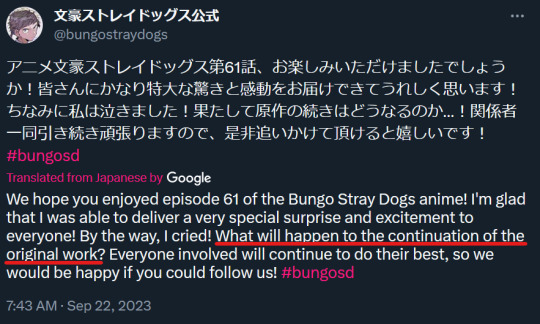

Like. I cannot even emphasize how hard they are trolling us at this point. Something is going on. Something is being cooked over there, the likes of which we've never seen before... and I don't think any of us are ready for it.
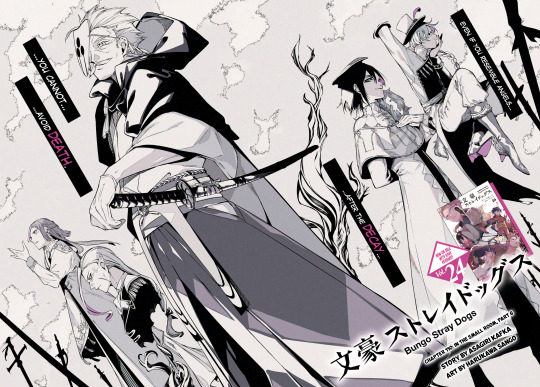
Oh yeah, and one last thing of note: both Fyodor and Nikolai here have their right arms hidden from view. Is that alluding to anything? I'm not sure. I also think that since chapter 110 was so short, next chapter will likely be 110.5 instead of 111, and if that's the case, this title spread could still technically be associated with the next chapter... wherein we might see this Fukuchi, who ends up wreaking havoc, right before he jumps to the timeline in the anime, as we see him at the end of the s5 finale.
I guess we'll find out on Tuesday.
#bungou stray dogs#meta#bsd season 5#bsd s5 spoilers#alternatively titled 'when you copium so hard out of stewing in your denial anger and grief that it becomes reality'#is it still copium if there's strong evidence for it? idk#i DON'T know what i'll do if the stuff in this finale ends up being canon :))) make no mistake about that#but until the very moment the schrödinger's cat box is opened and i am forced to acknowledge it with my own two eyes in chapter 111/110.5#i am choosing to stay calm and rational and look at things with a sound mind... and acknowledge all the signs that are there#of which there are so many#Asagiri is a troll. he has always been a troll and this is more evident than ever lately#and he would know that everyone who watched the finale would take it at face value#never expecting it to go completely differently in the manga#and he's so much smarter than what was in that finale. he would never write those things. i would stake my life on it.#i don't care how many flaws BSD does have that i do acknowledge; he is a good writer in so many ways and he is so much better than /that/#i could fill an entire BOOK (ha ha) with all of the reasons why this finale does not work. seriously it is a never-ending can of worms#of ooc characterizations and plot holes and abandoned threads and straight up CONTRADICTIONS with what has been stated before in the arc#with fukuchi's motivations and presentation; with things that were happening in meursault; just.... so much illogical shit in general#THE MACHINE HEALED THEIR WOUNDS??? ARE YOU FOR REAL????#*sigh* but i said i wasn't gonna rant alskdjgfkdls#tbh though the only REAL thing i need to know that the finale was anime only was what the youtuber i watch pointed out:#that Bram magically regenerated all his clothes. because if it were Asagiri Bram would be naked from the shoulders down fjdkslsaskd#...anyway. This theory is real and true. I am manifesting it into existence 🙏🙏🙏#Asagiri my man...... you have never let me down yet in all the years I've known your series. Please don't let me down now.#I'm trusting in you more than ever right now...... and your ability to blow all our minds in the best possible way#(guys i'm really really really scared deep down; please hold me hahaha ahahahahaaaa- *cries*)#this would the coolest thing in the history of ever though if it happened though. I am SO EXCITED FOR THE POSSIBILITY!!!!!#ASAGIRI YOU SICK AND TWISTED MF; HOW DARE YOU MAKE ME BEG FOR MY FAVES TO SUFFER JUST SO THAT THIS BAD WRITING DOESN'T BECOME REALITY!!!!!!#he knows exactly what he's doing *SCREAMS* :))))))))
75 notes
·
View notes
Text
hot take? but the Twilight fandom needs to stop citing Mormonism for everything that happens in this hell series.
the characters aren't Mormon. the plot isn't Mormon. the wardrobe isn't Mormon. this series was WRITTEN BY a Mormon woman whose religious indoctrination influenced her work. there are themes, plot points, characterizations, etc, that are related to or in line with LDS teachings. saying the book/characters are Mormon is not the same.
the more you label everything in text as Mormon, the less likely you'll be able to identify the actual religious influences
and if you think you are somehow immune to the influence of something you cannot correctly identify, think again
#red thread corkboard squad needs to come back#besties wya :(#we were really on one when we were talking about theology in a critical way#now the fandom has genuinely adopted this insane notion that everything is or can be explained by Mormonism#and honestly guys not to be a hater but regurgitating meta & crit lit theory you learned via osmosis does not mean you Get It#considering the fact that the whole reason i started fuckmeyer 1.0 was to generate more crit lit discussion on twilight#you have no idea how much it pains me to say this#bc i WANT more crit lit discussion of this saga. analyzing literature is fun as hell!!!!!#but....... seeing people hop on shitposts & headcanons to 'prove' how much they 'know' the inner mechanisms of twilight#genuinely makes me sad. like the Point of analyzing lit is not to reaffirm your intelligence or show others how smart & woke you are.......
64 notes
·
View notes
Text
Threshold of Humanity: so about those demons huh?
Today, I conclude that the way Qifrey stands in doorways is the strongest proof we’ve had so far that Qifrey is, in fact, not human, but an artificial being born of forbidden magic. Or, as the witch society seems to name them, a “demon”.
Lots of images and spoilers up to chapter 69 under the cut!
On the outside looking in
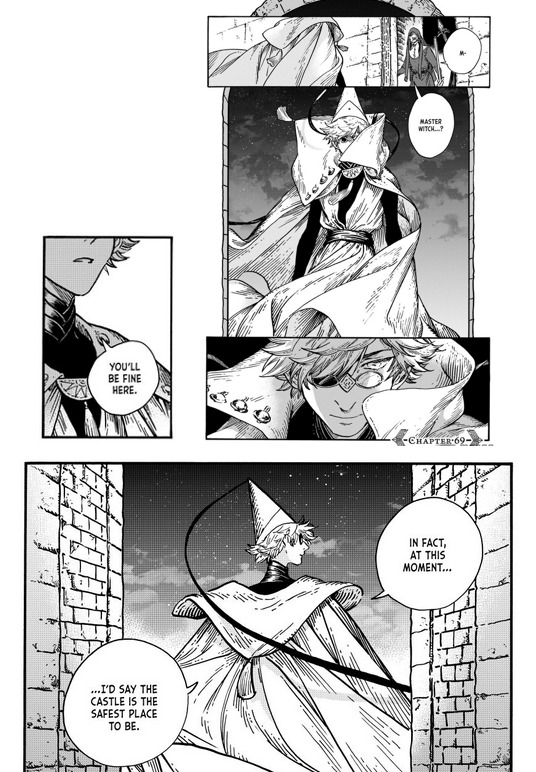
Let’s start by saying that in this chapter, Qifrey is back to his old habit of looking as suspicious as humanely possible. The first page is the only one where we briefly see his eye, with a look I want to describe as sorrowful, bitter and knowing. For the rest of the scene his face will stay partially hidden, and he never looks full on at the castle guard he is speaking to. His demeanor is distant, in contrast to the guard’s confusion and panic. In fact, it is a little funny how dodgy he is acting, given that he does nothing but noble deeds this entire chapter – bringing an escaped criminal back into custody, taking his apprentice to safety, safeguarding the medical tower against further attacks with a layer of salt.
So far, this looks like Qifrey’s classic brand of guilt-ridden self-sabotage, but the framing of the scene provides extra context. The threshold to Ezrest’s castle acts as a physical barrier separating Qifrey from the other man. During those three pages, they are both often shown framed by that doorway: the guard safe within the walls, contrasting Qifrey the outsider. The first page has a gust of wind pushing his robes around him, like an invisible force keeping him back. And we do know, because Qifrey emphasises this again for us, that this castle does indeed possess a natural repulsive force that keeps out monsters.
We are told in chapter 47 that, not only drawing magic within Ezrest castle won’t function, but that the castle’s walls repels all magical artefacts. It is because of that property that, when Coco notices that the leeches have not approached the castles’ walls, Qifrey immediately concludes that their current monstrous form is the result of a magical experiment.

Of course, “demons” are not the only beings who would be unable to enter the castle: any active spell should be repelled, meaning that Olruggio, for instance, can’t enter with his beautifying mask. Coco, with the bracelet stuck around her wrist, technically shouldn’t be able to enter at all, and the same goes for the characters with active magic drawn directy on their skin, like Coustas, Dagda and Eunie. In fact, even if he were perfectly human, it would be only natural for Qifrey to not step inside, since he couldn’t go in without taking off his glasses, which contain spells both to hide his scar and to protect him from harsh light.
And yet. I can’t help but see a very pointed parallel between Qifrey’s confidence that the castle will repel monsters, and the way the castle’s entrance seems to subtly repel him. In particular because it adds on to a long series of scenes featuring Qifrey’s anxieties around unnatural, magically created beings. This is at least the third time Qifrey brings up the creation of monsters in the days before the pact, which he calls “terrifying” and “a disgusting form of magic”. If the illustrations for those scenes are a glimpse into his mind, then it’s a mind full of nightmares. During their fight, the rogue Sage Engendil also lampshades how curiously familiar Qifrey seems to be with demons. Qifrey furthermore muses that he knows demons haven’t gone extinct, and in fact are still being created by witches to this day.

The demon in human skin
In short, my opinion is that chapters 68 and 69 together strongly hint at us that Qifrey is, or perceives himself as a demon. Now the question is: what new information would this reveal give us about him, his quest, and the way he has behaved so far?
First, we need to try and actually define what does and doesn’t count as a demon in that universe. Qifrey’s first halting description is “a monster, created with magic and by the hands of a witch”. A distinction is also made between magically altered animals that have adapted to their ecosystems and are useful or at least harmless to humans, and ferocious, uncontrollable beasts. So a demon is a new lifeform, artificially created through magic, that is inherently dangerous. The petty criminal from chapter 49 that got turned into a mindless and violent mass of giant leeches ticks all those boxes. Going by that logic, Coustas and Eunie wouldn’t fall into that category despite not being able to enter the Ezrest castle: modifying some of your body parts, or being turned into an existing animal wouldn’t count. Even Sasaran from the second test doesn’t seem to count as a demon: despite being hybridized with an animal, his consciousness hasn’t been affected and so he can’t be described as an “uncontrollable beast”, just a very heavily modified human.
One other interesting tidbit: “demon” is actually name dropped in chapter 59, a while before Qifrey’s fight with Engendil, when Beldaruit muses that a king who could use magic to gain power over life and death would become a “demon king”, someone capable of creating new lifeforms at will. This ties in the concept of demons to the other themes of the recent volumes, the dilemna of healing magic and resurection magic. What this could imply is that bringing someone back from certain death through magic carries the risk of altering them to the point where they would basically become a new lifeform, which has worrying implications for Dagda.
Going back to Qifrey though, there are three things we know for sure about him: 1) he has been experimented on with a type of magic never attempted before; 2) he looks and acts perfectly human, and 3) despite this, he is convinced that this new magic is dangerous, and must not only be destroyed but also kept secret at all costs. Finally, we know that those experiments left no visible trace on his body, because the Knights Moralis would have inspected him when they rescued him from the Brimhats (and would have soundly kicked him out of the Great Hall had they found anything). Barring other special characteristics we might not know about, what makes him unique as a demon is that he is undistinguishable from a normal human.
And that’s already more than enough to explain why he is freaking out so much.
What I like about this demon framework is that it can apply to several of the existing theories around Qifrey’s origin: whether he is a rescucitated corpse from Slistas, a silvertree turned human (I am still firmly standing behind that one), or a homonculus created from nothing by the Brimhats. In all three cases, whatever weird symptoms or powers he might have as a result of his creation, the very fact that he cannot be told apart from a human is what makes him truly dangerous. Because it shakes the very foundation of magical society.

We remember the central law of the Pointed Hats: the integrity of the human body is sacred, and therefore magic cast on the human body is taboo. A demon with a human appearance is a mockery of that principle, and a walking dilemna for the Pointed Hats. Demons used to be killed by heroes, and forbidden magical artefacts must be destroyed, but what do you do when that magical artefact is a living, breathing person?
(Speaking of, I have been wondering for a while what the Knights Moralis even do with people who have had spells tattooed on them, and especially those whose bodies have been altered. They can’t let them wander around, even with their memories gone, their very appearance would give the secret away. Do they keep them hidden in some prison or on an island, like the brainwashed witches? Asking for Eunie and Coustas, I’m worried about these kids)
From that perspective, Qifrey’s secrecy makes complete sense. The existence of demons with human faces not only raises all kinds of existential questions, but in the short term it risks making witch society even more repressive than it currently is. The Knights Moralis are already merciless to anyone seen with a tattooed spell or other evidence of having been involved with forbidden magic. Can you imagine how paranoid they would become if they literally couldn’t tell apart a demon from a human? Anyone could be a demon, pretty much.
In particular, this scenario explains why Qifrey is keeping the truth from those who might be tempted to help or protect him. After all, where would it leave Olruggio if he sided with a demon against his own society? Where would it leave Qifrey, if the only solution to erase that dangerous new magic were to destroy himself, but Olruggio wouldn’t let him? It also gives context to his line in chapter 40 “You want me to stay as Professor Qifrey? I would also like that, if it were possible”, and his description of his life at the atelier as something almost like a dream. Professor Qifrey doesn’t exist, and he has no right to live that peaceful life.

Anger and hope
A final bit of character musing I want to add to this: this theory of Qifrey as a demon, and the way he wrestles with that knowledge, also sheds some light on his more erratic actions and mood swings so far. What makes his motivations difficult to follow is that he always seems tugged between two extremes: destructive anger and fervent hope. Both are actually coping strategies that he tries to use to protect himself against paralysing guilt.
His anger at the Brimhats allows him to redirect his self-disgust towards those who made him. The true demons are those who willingly create monsters, he tells Engendil during their fight. These moments where he faces the Brimhats bring out a very different side of him, one that is confident, indignant and spiteful. Then, rather than being blinded by anger into chasing senseless revenge, he is calling on that anger to steel his resolve. He is using that indignation as a motivator to right a wrong done against both himself and witch society as a whole, even if he has to destroy himself in order to do so.
On the other hand, he seems to hold onto some hope that he might, somehow, erase the magic that created him but still miraculously keep himself alive. That is the side of him that fervently believes in the miracles of magic and in the power of creativity, inspired in him by Beldaruit, and passed along to Coco. His stance seems to be that he needs to dive into the ugly core of those experiments, and that maybe, just maybe, a way to save himself will occur to him just in the nick of time. It’s an interesting coincidence, by the way, that he is staring down the maws of water-dwelling demons while having those thoughts.
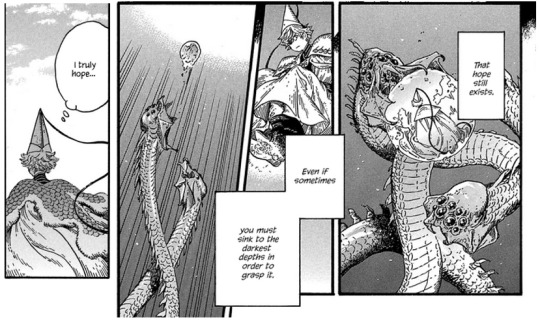
And on that note, hold on to indignation and hope when the going gets tough (but don’t brainwash your friends), and thank you for reading!
#witch hat atelier#witch hat meta#witch hat spoilers#qifrey#treefrey#sort of: this is a more general theory#I do apologise about the quality of those images#might try to fix that later#go go little demon tree go
103 notes
·
View notes
Text
Love how Vox and Velvette seem to alternate between portraying themselves as the ‘head’ of their little trio, with Velvette referring to herself as “the backbone of the Vees” and Vox plastering his logo over everything and vehemently denying Alastor's insinuation that he couldn't go on without the other two.
And meanwhile, like… Hells entire cinematic industry seems to mostly centre around porn.
Like, I'm sure there are other films out there (Blitzø has apparently seen Shrek) but the “cinephiles” are all off watching “award winning demon bukkake shows”. And I'd be very surprised if the internet porn industry wasn't also pretty big.
Outside the main three Vees, Angel Dust appears to be the figure most associated with their brand. Not any of Velvette's models or Vox's stars. And posters of Angel appear in the Lust Ring in Ozzies, implying that Val's influence extends outside Pride, something that doesn't seem to be the case for the other Vees.
And the whole reason Vox had to hire Sir Pentious to spy on the hotel is because Val hires so many people that all the randos on the street who might be looking for a quick buck were already working for him. Given how sex-obsessed the culture is generally (and considering that for every pornstar Val hires, he's also going to need several camera people, sound people, set designers, editors, etc.) Val could easily qualify as the biggest employer in Pride.
And if he owns even a fraction of those souls, he'd probably be one of the most powerful Overlords with or without the other two backing him up.
And that's not even getting into the age thing!
All the Media Demons seem to be loosely associated with the era when their chosen form of media got popular.
Vel is the social media demon, and one of the youngest Overlords, seeming to have died in the '10s. Vox is the TV demon and supposedly died in the 1950s. Alastor is the Radio Demon and died in the 1930s.
Photographic porn first became a big thing in the late 1800s. Val's style of dress to me loosely indicates 1910s or 1920s. If we're sticking with the established pattern then Valentino could well be older than Alastor.
What I'm saying is: the reason Valentino seems so much less concerned with the image and branding of the Vees compared to the other two might not just be him being dumb and impulsive.
From his perspective, the whole Vee thing might just be something his boyfriend and best friend are invested in, that he just kinda puts up with (and, heck, probably finances) because it makes them happy and gets him out of Overlord meetings.
Out of the three of them, Val may actually be the one who would be most able to go it alone, and the one who is the main source of their power. Possibly the only reason Vox and Vel even get to argue over who is the top dog in the group is because the actual top dog is too busy with his real business to give much of a shit about their fun side project.
#hazbin hotel#hazbin headcanons#hazbin meta#vox hazbin hotel#valentino hazbin hotel#hazbin hotel velvette#the vees#vox and vel are having serious group meetings to discuss preserving their territory and exploiting weaknesses in their political enemies#while val is bedazzling his gun in his boyfriend's aquarium#while the other two bitch about some tiff they're having with another overlord#and he pretends to listen#just in general i love the idea of val actually being way more intelligent than most people give him credit for#but his priorities are different to the other vees#so he doesn't show it much outside his own business
42 notes
·
View notes
Text

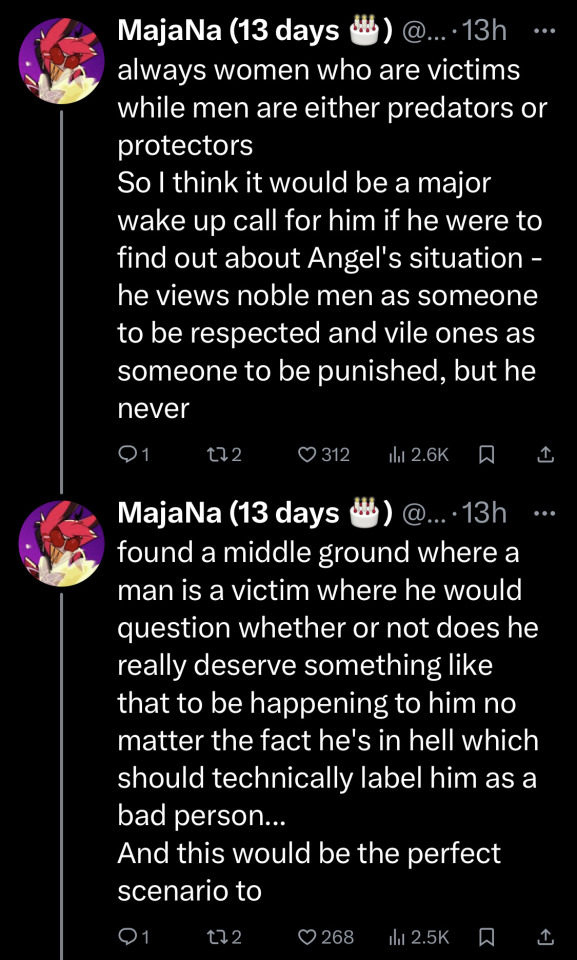
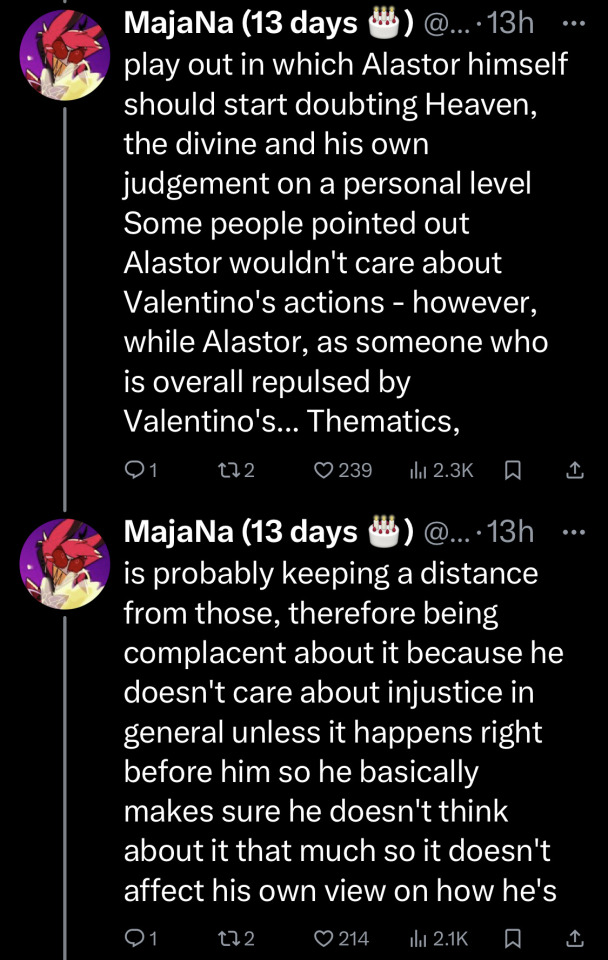

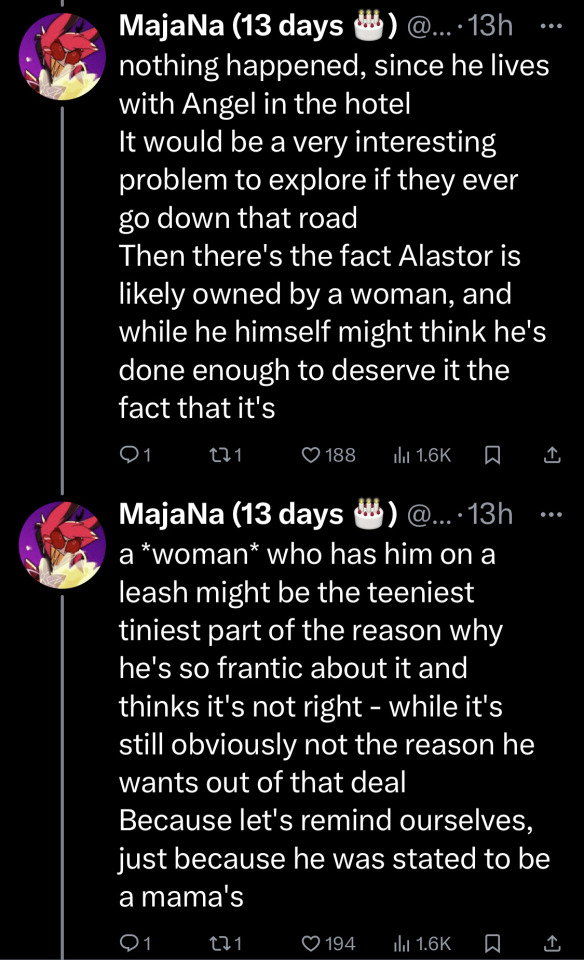

THIS! this entire thread, right here!!
#ohhh desperately praying for more al and angel interactions next season#and also i hope in general we ger more tidbits about his life#it is important to remember that although he does prefer being around women more than men his relationship with gender likely isnt perfect#hes better than most the men who came from his time but hes also still worse than many people who came after his time#and i also believe that just because he loved his mother and she loved him doesnt mean their relationship was perfectly healthy#my post#hazbin hotel#hazbin hotel analysis#hazbin hotel alastor#hazbin alastor#hazbin hotel angel dust#hazbin angel dust#hazbin hotel meta#fictional sexism#fictional sa
37 notes
·
View notes